新东方超实用的四级词汇笔记
- 格式:doc
- 大小:157.50 KB
- 文档页数:32
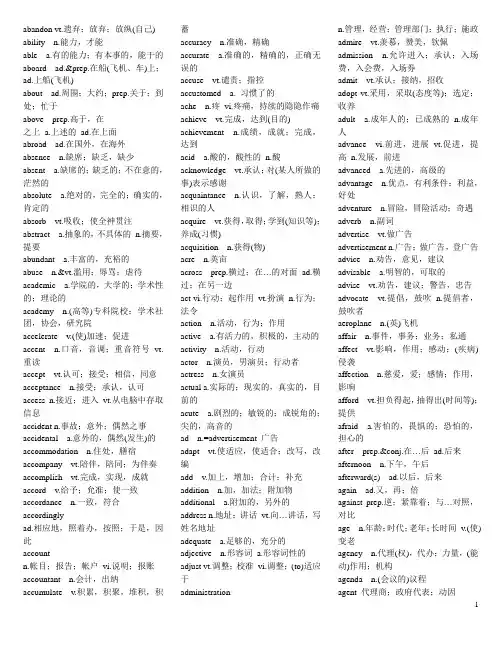
abandon vt.遗弃;放弃;放纵(自己) ability n.能力,才能able a.有的能力;有本事的,能干的aboard ad.&prep.在船(飞机、车)上;ad.上船(飞机)about ad.周围;大约;prep.关于;到处;忙于above prep.高于,在之上 a.上述的ad.在上面abroad ad.在国外,在海外absence n.缺席;缺乏,缺少absent a.缺席的;缺乏的;不在意的,茫然的absolute a.绝对的,完全的;确实的,肯定的absorb vt.吸收;使全神贯注abstract a.抽象的,不具体的n.摘要,提要abundant a.丰富的,充裕的abuse n.&vt.滥用;辱骂;虐待academic a.学院的,大学的;学术性的;理论的academy n.(高等)专科院校;学术社团,协会,研究院accelerate v.(使)加速;促进accent n.口音,音调;重音符号vt.重读accept vt.认可;接受;相信,同意acceptance n.接受;承认,认可access n.接近;进入vt.从电脑中存取信息accident n.事故;意外;偶然之事accidental a.意外的,偶然(发生)的accommodation n.住处,膳宿accompany vt.陪伴,陪同;为伴奏accomplish vt.完成,实现,成就accord v.给予;允准;使一致accordance n.一致,符合accordinglyad.相应地,照着办,按照;于是,因此accountn.帐目;报告;帐户vi.说明;报账accountant n.会计,出纳accumulate v.积累,积聚,堆积,积蓄accuracy n.准确,精确accurate a.准确的,精确的,正确无误的accuse vt.谴责;指控accustomed a. 习惯了的ache n.疼vi.疼痛,持续的隐隐作痛achieve vt.完成,达到(目的)achievement n.成绩,成就;完成,达到acid a.酸的,酸性的n.酸acknowledge vt.承认;对(某人所做的事)表示感谢acquaintance n.认识,了解,熟人;相识的人acquire vt.获得,取得;学到(知识等);养成(习惯)acquisition n.获得(物)acre n.英亩across prep.横过;在…的对面ad.横过;在另一边act vi.行动;起作用vt.扮演n.行为;法令action n.活动,行为;作用active a.有活力的,积极的,主动的activity n.活动,行动actor n.演员,男演员;行动者actress n.女演员actual a.实际的;现实的,真实的,目前的acute a.剧烈的;敏锐的;成锐角的;尖的,高音的ad n.=advertisement 广告adapt vt.使适应,使适合;改写,改编add v.加上,增加;合计;补充addition n.加,加法;附加物additional a.附加的,另外的address n.地址;讲话vt.向…讲话,写姓名地址adequate a.足够的,充分的adjective n.形容词a.形容词性的adjust vt.调整;校准vi.调整;(to)适应于administrationn.管理,经营;管理部门;执行;施政admire vt.羡慕,赞美,钦佩admission n.允许进入;承认;入场费,入会费,入场券admit vt.承认;接纳,招收adopt vt.采用,采取(态度等);选定;收养adult a.成年人的;已成熟的n.成年人advance vi.前进,进展vt.促进,提高n.发展,前进advanced a.先进的,高级的advantage n.优点,有利条件;利益,好处adventure n.冒险,冒险活动;奇遇adverb n.副词advertise vt.做广告advertisement n.广告;做广告,登广告advice n.劝告,意见,建议advisable a.明智的,可取的advise vt.劝告,建议;警告,忠告advocate vt.提倡,鼓吹n.提倡者,鼓吹者aeroplane n.(英)飞机affair n.事件,事务;业务;私通affect vt.影响,作用;感动;(疾病)侵袭affection n.慈爱,爱;感情;作用,影响afford vt.担负得起,抽得出(时间等);提供afraid a.害怕的,畏惧的;恐怕的,担心的after prep.&conj.在…后ad.后来afternoon n.下午,午后afterward(s) ad.以后,后来again ad.又,再;倍against prep.逆;紧靠着;与…对照,对比age n.年龄;时代;老年;长时间v.(使)变老agency n.代理(权),代办;力量,(能动)作用;机构agenda n.(会议的)议程agent 代理商;政府代表;动因aggressive好斗的;敢作敢为的agriculture农业;农学aid救护;助手aircraft飞机;飞行器airline航空公司;航线airplane飞机airport机场;航空港alarm忧虑;使惊恐;使担心alcohol酒精;乙醇alert警觉的;使认识到;警报alike相同的;一样的;同样程度的alliance结盟;联盟allocate分配;分派;把拨给allow准许;承认;准许进入allowance补贴;零用钱ally联合;同盟国;同盟者alongside在旁边;沿着边;和;在一起alphabet字母表;字母系统alter变更;变动alternative替换物;选择;另类的altitude海拔;高度;高处aluminum铝amateur业余爱好者;业余的;外行的amaze使惊奇;使惊愕ambassador使节;派驻国际组织的代表ambition雄心;期望得到的东西ambulance救护车;野战医院amid在之中;被围绕amongst在之中amuse逗;乐;给娱乐analyze分析;分解;解析analysis分析;分析报告;分解ancestor祖先;原形;先驱anchor锚;抛锚;使固定;担任主持人ancient古老的;年老的angle观点;使带有倾向性;钓鱼;谋取ankle踝;踝关节anniversary周年纪念日annoy使恼怒;打扰annual每年的;年鉴;一年生的植物anticipate预期;先于行动;提前使用antique古董;古时的anxiety忧虑;渴望anxious忧虑的;另人焦急的;渴望的anyhow无论如何;随随变变的;杂乱无章的anyway无论如何;至少apart相间隔;分开;分离的apartment一套公寓房间apologize谢罪;认错apology认错;谢罪appearant表面上的;明显的appeal呼吁;吸引力;上诉appearence出现;来到;外观appetite胃口;欲望applause鼓掌,掌声appliance器具;器械applicable能应用的;合适的applicant申请人application申请书;实施apply应用;申请;敷appoint委任;约定;指定appointment约定;约会;委任的职位appreciate赏识;领会;增值approach向靠近;靠近appropriate适当的;恰当的approve同意;批准approval赞成;赞许;批准approximate近似的approximately近似;估计arbitrary随心所欲的;专断的architect 建筑师, 设计师, 缔造者architecture 建筑学,建筑式样argue 争辩,主张,说服argument 辩论,理由,说理arise 由引起,起身,起床arithmetic 算术,四则运算arouse 引起,唤起,唤醒arrange 安排,准备,整理arrangement 排列,安排,准备工作arrest 拘留,羁引,扣留arrival 到来,到达者,到达物arrow 箭,箭状物,箭头符号artificial 人为的,矫揉造作的,模拟的artistic 艺术家的,富有艺术性的,精美的ash 灰,灰末,骨灰ashamed 惭愧的,羞耻的,害臊的aside 在旁边,到旁边aspect 朝向,方向,外表assemble 集合,召集,装配assembly 议会,集合,装配assess 对...进行估价,评价,评论asset 财产,有价值的特性或技能,优点assign 指派,分配,布置assignment 任务,指定的作业,分配assist 援助,帮助assistance 协助,援助assistant 助理,助教,助理的associate 把...联系在一起,交往,伙伴association 团体,联合,交往assume 假设,臆断,呈现assumption 臆断,担任,承担assure 使确信,确保,向保证astonish 使惊讶,使吃惊athlete 运动员,体育家atmosphere 空气,气氛,环境atomic 原子的,原子能的,原子武器的attach 附加,使依恋,使附属,认为有attack 进攻,突然发作attain 达到,获得,完成attempt 尝试,试图, 努力attitude 态度,看法,姿势attorney 律师,代理人attract 吸引,引起注意attraction 吸引,引力,具有吸引力的事物attractive 有吸引力的,引起注意的attribute 把归因于,属性audience 听众,观众,读者audio 听觉的,声音的author 著作家,作者authority 权力,当权者,权威auto 汽车automatic 机械的,不假思索的,自动手枪,有自动装置的汽车automobile 汽车,机动车auxiliary 辅助的,附属的, 后备的available 通用的,可取的,可得到的avenue 道路,大街average 平均,平均的,平常的avoid 避免,躲开,撤消await 等候,期待,将降临到身上award 奖品,给予,判给aware 知道的,意识到的awful 难过的,非常的,极大的awkward 尴尬的,难操纵的,不灵巧的ax 斧子background 出生背景backward进步慢bacon 咸肉bacteria细菌baggage行李bakery烤balance使...平衡balcony阳台balloon气球banboo竹子ban查禁band乐队bang猛击bankrupt破产banner横幅barber理发师bare光秃的barely仅仅bargain讨价还价bark叫声barn谷仓barrel圆筒barrier检票口baseball棒球basically基本上basis基础bat蝙蝠battery蓄电池bay 弯beam衡量bean豆,蚕豆beard胡须bearing风度beast野兽beggar乞丐behalf利益behave举止behaviour行为being 存在,生物belief信念bebeloved所忠爱的beneath在下方beneficial有利的benefit救济金,恩惠besides除...之外bet 打赌bible圣经bid企图billion十亿bind捆绑biology生物学blade 刀刃,刀片blank茫然的,空白的,blast冲击波bleed 流血blend 混合bloody 非常的bloom 开花boast 吹嘘bold 卤莽的bond 连接boom 迅速发展boost 提高boot 靴子border 边缘bore 使...厌烦boring n.&adj. 令人厌烦的,乏味的,无聊的bounce v. 反弹bound v.跳跃,给划界,限制boundary n.分界线,边界brake v.刹车,刹住,用闸,放慢速度brand n.烙印,铭刻,加污名于,谴责brass n.黄铜,黄铜器,铜管乐器brave adj. 勇敢的,华丽的breadth n.宽度,幅度,幅面breast n.乳房,胸膛breed v.繁殖,酿成,产生breeze n.&v.和风,飘然而行brick n.砖块,砖状物bride n.新娘brief adj.短暂的(像介绍基本情况、概要)brilliant adj.光辉的,卓越的broom n.扫帚brow n.额,眉,眉毛boil v.冒泡,沸腾bucket n.水桶,药桶,铲斗budget n.&adj. 预算,安排,收费公道的bulb n.电灯泡,球状物bulk n.体积(变得越来越大),使更大bullet n.枪弹,子弹,弹丸bump v.碰,撞,颠簸着前进,肿块bunch v.捆,扎,使成一束bundle v.&n.捆,包袱,把塞入bother v.&n.精神负担,烦扰,装载bureau n.局,司,处,社,所burst v.使爆炸,突然打开butcher n.肉贩,屠夫,残杀butterfly n.蝴蝶cabbage n.洋白菜,卷心菜cabin n.小屋,船舱,机舱cabinet n.橱,柜,内阁cable n.索,电缆,电报calculate v.计算,估计,计划calculator n.计算器,计算者calendar n.日历,历书,历法calm adj.&v.静的,平静的,镇静camel n.骆驼campaign n.&v.运动,参加运动,参加竞选campus n.校园,学校场地canal n.运河,沟渠,管cancel v.撤消,删去cancer n.癌症,肿瘤candidate n.候选人,投考者,申请求职者candy n.糖果capable adj.有能力的,有才能的capacity n.能量,才能,身份captive v.虏获,俘获,夺得carbon n.碳career n.生涯,职业,经历cargo n.船货,货物carpenter n.木工,木匠carpet n.地毯carriage n.客车厢,四轮马车conveyance n.运输工具,载重架,置物架carrot n.胡萝卜cart n.大车cartoon n.卡通画,动画片cash n.现款,把兑现cashier n.出纳员case n.盒式录音带,盒子cast n.浇铸,演员表,石膏绷带casual adj.偶然的,非正式的,临时的catalogue n.目录,将编入目录,将编目catalog n.目录册,一系列,将编入目录category n.种类,类别cattle n.牛,牲口,家畜cautious ['k3:54s] adj.十分小心的,谨慎的cease [si:s] v./n. 停止,终止cement [si'ment] n.①水泥②胶结材料;vt.①粘结,胶合②巩固,使团结center [5sentE] n.中心, 中央, 中心点, 中锋centigrade ['sentigreid] adj.摄氏的centimeter ['senti`mi:t4] n.厘米(cm) ceremony ['serim4uni, 'serim4ni] n.①典礼,仪式②礼节,礼仪certificate [s4'tifikit] n.证(明)书,执照challenge ['t51lind9] vt.①向...挑战②反对,公然反抗③对...质疑,对...怀疑; n.①艰巨的任务②怀疑,质问③挑战,邀请比赛chamber ['t5eimb4] n.①会议厅,会所②(作特殊用途的)房间③腔,室champion ['t51mpj4n] n.①冠军②捍卫者,拥护者channel ['t51nl] n.①沟渠②海峡,水道,航道③频道④[常pl.]渠道,途径;vt. 形成航道,疏导chaos ['kei3s] n. 混乱,紊乱chap [t51p] n.(口)小伙子,男人,家伙chapter ['t51pt4] n.章,回,篇character ['k1rikt4] n.①性格,品质,品德②性质,特征,特色③人物,角色④(书写或印刷)符号,(汉)字characteristic [`k1rikt4'ristik] adj.特有的,典型的;n.特性,特征characterize ['k1rikt4raiz] vt.①成为...的特征,以...为特征②描绘(人或物的)特性,描述charge [t52:d9] n.①价钱,费用②控告,指控,指责③电荷,充电,负荷④管理,照管,掌管;vt.①索(价),要...支付②控告,指控,指责③使充电,使充满;vi.①收费,要价②冲锋,向前冲charity ['t51riti] n.①救济金,施舍物②[常pl.]慈善团体,慈善事业③宽容,仁慈charm [t52:m] n.①迷人的特性,魅力②符咒,咒文;vt.吸引,迷住chart [t52:t] n.①图,图表②航图,海图;vt.用图表表示,在图上表示charter ['t52:t4] vt.包租;n.①宪章,共同纲领②特许状,许可证③(飞机、汽车等的)包租,包机chase [t5eis] n./vt.追逐,追捕,追求cheat [t5i:t] vt.欺骗,骗取; vi.行骗,作弊;n.①欺骗,欺诈行为②骗子cheerful ['t5i4ful] adj.①高兴的,欢乐的②使人感到愉快的chemical ['kemik4l] adj.化学的;n.化学制品chemist ['kemist] n.①化学家②药剂师,药商chest [t5est] n.胸腔, 胸膛, 箱, 柜chew [t5u:] v.咀嚼,咬chief [t5i:f] n.首领, 领袖, 主要部分adj.主要的, 首要的,childhood ['t5aildhud] n.童年,幼年chill [t5il] vt.使变冷,使冷冻,使感到冷;n.①寒冷,寒气②风寒,寒战chin [t5in] n.下巴,颏chip [t5ip] n.①屑片,碎片②[常pl.]炸土豆条(或片)③集成电路片,集成块④缺口,瑕疵;vt. 削(或凿)下(屑片或碎片)choke [t54uk] v.①(使)窒息,呛②塞满,塞住chop [t53p] vt.砍,劈,斩;n.排骨Christ [kraist] 基督,救世主Christian ['krist54n, 'kristj4n] n.基督教徒;adj.基督教(徒)的cigar [si'g2:] n.雪茄烟cigarette [`sig4'ret] n.香烟,卷烟circuit ['s4:kit] n.①电路,线路②环行,环行道circular ['s4:kjul4] adj.①圆形的,环形的②循环的,兜圈子的;n. 通知,通告circulate ['s4:kjuleit] v.①(使)循环,(使)流通②(使)流传,散布,传播circumstance ['s4:k4mst4ns] n.①环境,条件,形势②[pl.]境况,经济状况cite [sait] vt.①引用,引证②传唤,传讯③表彰,嘉奖civil ['siv4l] adj.①公民(间)的, 国内的②平民的,文职的,民用的③民事的,民法的④文明的,有教养的civilian [si'vilj4n] n.平民,百姓(与军人、警察相对而言)civilization [`sivilai'zei54n] n.文明,文化civilize ['sivilaiz] vt.使文明,使开化claim [kleim] vt.①声称,断言②对...提出要求,索取③(灾难等)使失踪或死亡④需要,值得;n.①要求,认领,索赔②声称,断言clap [kl1p] vi./n.鼓掌,拍手;vt.拍,击clarify ['kl1rifai] vt.澄清,阐明clash [kl15] vi.①发生冲突②不协调③砰地相撞, 发出刺耳的撞击声;n. ①发生冲突②不协调③砰地相撞,(金属等的)刺耳的撞击声classic ['kl1sik] adj.①最优秀的,(可作)典范的②典型的,标准的③传统式样的,典雅的;n.①文学名著,经典作品,杰作;②优秀的典范③[pl.]古典文学,古典语文研究classical ['kl1sik4l] adj.古典的,经典的classification [`kl1sifi'kei54n] n.①分类,分级②类别,级别classify ['kl1sifai] vt.把...分类,把...分级clause [kl3:z] n.①(法律文件等的)条款②从句,分句claw [kl3:] n.爪,脚爪; v.(用爪)抓,撕clay [klei] n.粘土,泥土clerk [klB:k; klE:k] n.职员, 办事员, <美> 店员click [klik] v.(使)发出咔哒声;n.咔哒声(上锁等发出的声音)client ['klai4nt] n.委托人,当事人,顾客cliff [klif] n.悬崖,峭壁climate ['klaimit] n.①气候,气候区②风气,气氛clue [klu:] n.线索,提示clumsy ['kl8mzi] adj.①笨拙的,粗陋的②不得体的,不策略的coach [k4ut5] n.①教练,指导②长途公共汽车③(铁路)旅客车厢; vt. 训练,指导,辅导coarse [k3:s] adj.①粗的,粗糙的②粗劣的③粗俗的coil 圈,线圈cllapse 倒塌,突然失败colleague 同事,同僚collection 收集,收藏品collective 集体的,团体collision 冲突,抵触colony 殖民的,群体column 支柱,执行,专栏comb 梳子,梳理,在搜寻combat 战争,与...斗争combination 结合,联合,化合combine 化合,联合企业,联合收割机comedy 喜剧,喜剧性command 命令,指挥,控制commander 司令官,指挥员comment 评论,议论,评论commerce 贸易,社交commercial 商业的,商业性的commission 委任状,授权commit 犯,干,使承诺commitment 承诺,许诺committee 委员会,全体委员commnicate 通讯,传达,传染commnication 通讯,通讯工具community 社区,团队companion 同伴,共事者comparable 类似的,比的上的comparative 比较的,相对的compare 对照,把...比作comparison 比较,对照,比拟compass 指南针,界限compel 强迫,迫使屈服compete 比赛,竞争,对抗competent 有能力的,能胜任的competition 竞争,比赛competitive 竞争的,有竞争力的complain 抱怨,投诉complaint 抱怨,怨言,控告complex 复合的,综合体,夸大的情绪反映complicated 复杂的,难懂的conponent 组成部分,构成的compose 组成,为...谱曲,使平静compound 化合物,复合的/使...恶化,加重,使合成comprehension 理解,理解力测验comprehensive 广泛的,综合的,理解的compress 压紧,压缩comprise 包括,构成compromise 妥协,危机,放弃conceal 把...隐藏起来,掩盖concede 承认,承认失败,让步concentrate 全神贯注,浓缩物concentration 集中,专注concept 概念,观念,设想concern 关切的事,涉及concerning 关于concession 让步,承认conclude 推断出,缔结conclusion 结论,结尾,议定concrete 混凝土,具体物,实在的condemn 谴责,指责,判...刑condense 冷凝,使冷结,减缩condition 状态,环境conduct 举止,引导conductor 售票员,指挥,导体conference 议论会,讨论confess 供认,坦白confidence 信赖,信心confident 确信的,肯定的,自信的confine 限制,禁闭confirm 证实,批准conflict 冲突、抵触,争论confront 迎面遇到,遭遇,勇敢的面对confuse 使困惑,把弄糊涂confusion 困惑,糊涂congratulate祝贺,向道喜congratulation贺词,祝贺congress 代表大会,国会conjunction结合,连接,连词connect结合,连词,给接通电话connection 连接,熟人,关系connection衔接,连贯性,熟人conquer 征服,克服conquest 攻取,征服conscience 良心,道德心conscious 意识到的,自觉的consent同意,赞成,同意consequence 后果,重要consequently 因此,因而conservation 保护,避免浪费,守恒conservative 保守的,保守的人considerable相当大的,重要的considerate考虑周到的,体贴的consideration思考,要考虑的事,体贴consist由组成,在于一致consistent 坚持的,一贯的,一致的constant 经常的,忠诚的,常数,恒量constitute形成,设立,任命constitution 章程,组成,设立construct构思,建筑物,构想construction建筑物,结构consult请教,查阅,商议consultant顾问,会诊医师,专科医生consume消费,喝光,毁灭consumer 消费者,用户,消耗者,consumption消耗,消费contact 接触,与接触,与取得联系container容器,集装箱contemporary同时代的,一代人contest竞赛,争夺contest 争夺,与竞争,与提出质疑continue连续的,频频的continuous连续不断的,延伸的contract契约,合同contract 缩小,订合同,感染controdiction 不一致,否认controary 相反的,相反contrast 对比,对照,反差contrast 对比,形成对比contribute捐献,捐款,投稿contribution 贡献,捐献物,稿件controversial 引起争论的,有争议的controvesy 争论,辩论convenience 方便,便利设施convention 惯例,公约conventional 习惯的,常规的,因循守旧的conversely 相反convert 转变,转化,改变convey 表达,传递,运送convict 证明有罪,宣判有罪convict 囚犯conviction 坚定的信仰,说服,定罪convince 使信服,说服cooperative 协作,配合coordination 调节,座标,同等的cop 警察cope 应付,处理copper 铜,铜币,铜制器copyright 版权cord 细绳,粗线,锁灯心绒裤core 果实的心,核心,要点corporation 公司,企业,社团coorespond 相符合,相当,通信correspondence信件,通信联系,符合correspondent 通信员,记者corresponding a. 相应的,符合的,一致的corridor n.走廊,回廊,通路costly a.昂贵的;价值高的council n.理事会,委员会counsel n.劝告,忠告;律师counter n.柜台,计数器courtyard n.庭院,院子county n.郡,县court n.法院,法庭;球场crack n.裂缝,裂纹vi.爆裂craft n.工艺;手艺,行业crane n.起重机,摄影升降机crash vi.碰撞,坠落n.碰撞crawl vi.爬,爬行,缓慢的行进create vt.创造;引起,产生creative a.创造性的,创作的creature n.生物,动物,家畜credit n.信用贷款;信用creep vi.爬行;缓慢地行进crew n.全体船员,一队团员cricketcrime n.罪,罪行;犯罪criminal n.犯人,罪犯,刑事犯crisis n.危机critic n.批评家,爱挑剔的人critical a.决定性的;批评的criticallycriticism n.批评;批判;评论criticize vt.&vi.批评;责备crossing n. 交叉;交叉点,十字路口crop n.庄稼,农作物,收成crow n. 乌鸦v./n. 鸡啼,鸣叫crowd n. 人群;一群v. 聚集;挤满crown n.王冠,冕;花冠crucial a.决定性的,紧要关头的crude a.简陋的;天然的,粗鲁的crush vt.压碎,碾碎;镇压crust n. 1.地壳2.面包皮,硬外皮,外壳crystal n.水晶,结晶体cube n.立方形;立方cue n. 暗示;信号,指示cucumber n. 黄瓜cultivate vt.耕;种植;培养culture n. 文化,文明cupboard n.碗柜,碗碟橱;食橱curiosity n.好奇,好奇心;珍品curious adj.好奇的curl vt.&vi.卷曲n.卷发,卷曲物currency n. 通货,货币,流通,流行curricular a. 课程的current a. 现时的,当今的currently ad. 现在, 当前curse n.诅咒,咒骂curtain n.(窗、门)帘;幕curve n.曲线;弯vt.弄弯cushion n.软垫子,靠垫cycle n. 自行车,循环dairy n. 牛奶场,乳品店,乳制品dam n.水坝,水堤;障碍物damagedamn v. 指责,攻击,咒骂n. 诅咒用语damp a.潮湿的,有湿气的dash vt&n .猛冲,破折号data n. 资料,数据daylight n.日光;白天;黎明deadline n. 最后期限,截止日期deaf adj.聋的,不愿听的debate n.,vt.&vi.争论/辩论debt n.债,债务,欠债decade n.十年,十年期decay vt.使腐朽,使腐烂deceive vt.欺骗,蒙蔽,行骗decent a.正派的;体面的deck n.甲板;舱面;层面declaration vt.断言;声明;表明decline vi. 下降,衰落n. 衰退,斜坡,谢绝decorate v. 装饰,装潢,布置decrease v./n. 减少,减小defeat vt&n 战胜,挫败defect n. 缺点,欠缺define vt. 定义definite a. 明确的,肯定的,限定的definitely ad.一定地,明确地definition n.定义,释义;定界delegate n. 委员,代表vt. 派为代表,委任delete vt.删除;擦掉deliberate a. 故意的,深思熟虑的delicate a.纤细的,优雅的;精致的;微妙的delicious a. 美味的delivery n. 分娩,投递(的邮件)demand vt. 要求,需求,需要democracy n. 民主,民主制,民主国家democratic a. 民主政体的,民主主义的demonstrate vt. 表明,论证,说明dense a. 密集的,浓厚的,密度大的density n. 密集,稠密,密度dental a. 牙齿的,牙科的deny v. 否认,拒绝depart v.离开,起程,出发departure n.离开,出发,起程dependent a. 依靠的,依赖的deposit vt.(使)沉淀,存款,储蓄depress vt. 使沮丧,使不景气,使消沉depression n.沮丧;不景气,萧条deputy n. 副职,代表a.代理的,副的derive vt.取得,得到,追寻的起源,派生descend vi. 下来,下降describe vt. 叙述,描写,描绘,形容deserve v. 应受,值得design v&n. 设计,图样,企图,图案desirable a. 值得向往的,称心的,合意的,理想的desire v./n. 愿望,欲望despair n./vi. 绝望desperate a. 拼死的,急需要的,绝望的despite prep. 不管,尽管,不论dessert n. 甜食,甜点心destination n. 目的地,终点,目的,目标destruction n.破坏,毁灭,消灭detail n. 细节,详情,琐事detect v. 觉察,发觉,侦察,探测detection n.察觉,发觉;侦察detective n. 侦探a. 侦察(用)的determination n. 决心,决定determine v. 决定,使下决心device n. 器械,设计,方法,器具,设备devil n. 魔鬼,家伙devise v. 设计,发明,想出devote vt.将奉献(给),致力于(to)diagram n. 图表,图解vt. 图解dialect n.方言,土语,地方话diameter n. 直径dictate v. 口授,(使)听写;命令dictation n. 听写,口述;命令differ vi. 不同,发生分歧,与意见不同digest v.消化;领会,领悟n.文摘digital a. 数字的dim a. 微暗的,模糊不清的v.(使)变暗淡dimension n. 尺寸,尺度,方面,面积dip v./n. 浸,蘸diplomatic a. 外交的,从事外交的;策略的directly ad. 直接地,径直地;马上,立即dirt n. 污物,污垢,泥土disappear vi. 消失,不见,消亡,失踪disaster n.灾难,灾祸;天灾discard vt. 1.放弃,抛弃discharge v./n. 释放,卸货,排出,放出discipline n. 纪律vt.惩罚, 训练disclose vt. 使显露,揭露;泄露discount n.折扣;减价vt. 打折扣discourage vt. 使泄气,使灰心,阻止disease n.疾病disguise vi.隐瞒,掩埋n.用来伪装的东西,假装disgust n.厌恶,憎恶dismiss vt.不再考虑;免职,解雇,开除disorder n.混乱,杂乱;骚乱display vt.陈列,展览displease v. 使不快,使生气disposal n. 处理,排列,处置dispose v. (of)处理,处置dispute vt./vi. 争吵,争论n. 争论,争端dissolve v.(使)溶解,(使)融化;解散distinct a. 分别的,不同的,清楚的,明白的distinction n. 1.差别,不同distinguish v. 区别,分清distress n. 忧虑,痛苦,苦恼distribute vt.分发,分送;分布distribution n.分发,分配;分布disturb vt.打扰,扰乱;弄乱disturbanceditch n.沟,沟渠,渠道dive vi./n. 1.跳水,潜水, (飞机)俯冲diverse a.不一样的,多种多样的,相异的divide vt. 分开,分配division n. 分配,分裂,分割divorce n./v. 离婚,分离,脱离document n. 公文,文献vt. 用文件证明dominant a. 占优势的,统治的,居高临下的dominate v. 支配,统治,控制;占优势donation n. 捐献;赠送donkey n.驴;笨蛋dorm n. 宿舍dormitory n.集体寝室;宿舍dose n. 剂量,一服,一剂v. (给)服药dot n. 点,圆点,小数点vt. 打点于doubtful a. 难预测的,可疑的,怀疑的downward adv.向下;...以下draft n.草稿;汇票vt.起草drag v.拖;拉;牵扯dragon n.龙drain vt.排去;放水n.耗竭drama n.一出戏剧,剧本,戏剧;戏剧性事件dramatic a.引人注目的,戏剧的drawer n.抽屉drift vi.漂流,漂泊n.漂流drill n&v. 钻头,操练drip vi.滴下;漏水n.水滴drugdrum n.鼓,圆桶drunk a.醉的;陶醉的dull a.乏味的,枯燥的;苯的dumb a.哑的;无言的dump vt.倾卸,倾倒;倾销durable a. 持久的,耐久的duration n.持续,持久dusk n.薄暮,黄昏,幽暗dye vt.染,把...染上颜色n. 染料dying a.垂死的;临终的dynamic a.有活力的;动力的,有生气的,有力的eager adj.渴望的;热心的eagle n.鹰earn vt. 挣得,赚得earnest a.认真的,诚恳的earthquake n.地震ease n. 容易,缓和,使舒适,使安心echo n. 回声,反响,共鸣vi. 发出回声;附和economic a.经济的,经济学的economical a. 节约的,经济(学)的economics n.经济学;经济edgeedition n.版,版本,版次editor n. 编辑editorial adj.编辑的; 主笔的n. 社论educate vt.教育;培养effecteffective a.有效的;有影响的efficiency n.效率;功效,效能efficient a.效率高的,有能力的effort n.努力;努力的成果elaborate a.复杂的;精心制作的elastic n.松紧带a.有弹性的elbow n. 肘vt.用肘挤,挤进elderly a. 上了年纪的,垂老的elect vt.选举,推选;选择election n.选举,选择权;当选electric a.电的,电动的electrical a.电的,电气科学的electricity n.电,电学;电流electron n. 电子electronic a.电子的,电子设备elegant a. 优雅的,优美的,精致的element n. 成分,要素,元素elemental a.基本的;自然力的elementary a.基本的;初级的elevator n.电梯;升降机eliminate vt.消灭,消除,排除elsewhere ad.在别处,向别处embarrass vt. 使窘迫,为难embassy n. 大使馆,大使馆全体工作人员embody vt. 1.表达,体现2.包含,包括embrace v./n. 1.拥抱,包含,包围emerge vi.出现,涌现;冒出emergency n.紧急情况,突然事件emission n. 1.散发,发射2.发出物,发射物emit vt.散发;发射;发表emotion n. 情感,激动emotional a.感情的,情绪的emperor n.皇帝emphasis n.强调,重点,重要性emphasize vt.强调,着重empire n.帝国employemployee n.受雇者,雇员,雇工employer n.雇佣者,雇主employment n. 雇用,工作enable vt.使能够,使可能enclose vt. 围住,附上,封入encounter vt.遭遇,遇到n.遭遇encourage vt.鼓励,促进ending n.结尾,结局;死亡endanger vt. 危及,使遭危险;危害endless a.无止境的endurance n. 忍耐(力),持久(力),耐久(性)endure vt.忍受;容忍,持久energyenforce vt.实施,执行;强制engage vt.使从事于;聘用,订婚engagement n. 约会,约定;婚约,订婚engine n.发动机,引擎;机车engineering n. 工程,工程学enhance vt.提高,增加enlarge vt. 扩大,扩展,扩充,放大enlightenenormous a.巨大的,庞大的enquire vi.vt. 询问inquire vt. 1.打听,询问2.调查,查问enquiry n. 询问inquiryenrich vt. 使富裕,使丰富ensure vt.保证;保护;赋予entertain vt.使欢乐;招待entertainment n.娱乐,招待,招待会enthusiasm n.热情,热心enthusiasticentire a.全部的,整个的entirelyentitle vt. 给权利,给...起名entry n. 进入;入口,通道;登记entrance n. 进入,入口,入场;入学envelope n.信封;封套environment n.环境,外界envy vt./n. 妒忌,羡慕episode n.文艺作品中的一段,插曲,幕equal a. 1.相等的2.平等的equality n. 1.同等,平等2.等式equator n.赤道,天球赤道equip vt.装备,配备equipment n.装备;设备equivalent a.相等的;等量的era n.时代,年代;纪元erect vt.建造;使竖立error n. 错误,过失,误差essay n.短文,散文,小品文essence n. 1.本质,实质2.精华,精粹essential a.必要的,本质的establish vt.建立,设立;确立establishment n. 建立,确定,建立的机构estate n.房地产;财产,产业estimate vt.估计,评价n.估计eternal a. 永久的,不朽的evaluate vt.评价,估的价eve n.前夜,前夕,前一刻evenly ad.一致地,平静地event n.事件,大事;事变eventually ad. 最后,终于everlasting a.永久的;持久的evidence n.根据;证据,证人evident a.明显的,明白的evidently ad.明显/显著自以为是evil adj.邪恶的n.罪恶evolution n.进化,发展;演变evolve vt.使进化;使发展exact a.确切的;精确的exaggerate vt.&vi.夸大/夸张exceed vt.超过,胜过;超出exceedingly ad.极端地,非常excellentexception n. 除外,例外excess n.超越;过量;过度excessive a.过多的,极度的excessivelyexchange vt.交换;交流n.交换excitation n. 刺激,鼓舞,兴奋exclaim vi.呼喊;惊叫exclude vt.把排除在外exclusive a. 排外的,独占的,专有的,孤傲的excursion n.远足;短途旅行execute vt.将处死;实施execution n.实行,执行;处死刑executive a.实行的,行政的exert vt. 尽(力),发挥,施加,产生,行使exhaust vt.使筋疲力尽;用尽exhibit vt.显示;陈列,展览exhibition n.展览existence n. 存在,生存,生活expand vt.扩大;使膨胀expansion n.扩大,扩充;扩张expectation n.期待,期望,预期expend v. 花费,用光expense n.花费,消费;费用expensive adj.昂贵的experimental adj. 实验的, 实验性的expert n. 专家,能手a. 熟练的,内行的experienceexplanation n. 解释,说明,辩解explode vt.使爆炸vi.爆炸exploit vt.剥削;利用;开发,开拓exploration n.考察;勘探;探查explore vt.&vi.探险/探索explorer n.探测者explosion n.爆炸,爆发,炸裂explosive n.炸药a.爆炸的export vt. 输出,出口expose vt.使暴露;揭露exposure n.暴露;揭露;曝光expressexpression n.词句;表达;表情extend vt. 延伸,扩大,伸展,伸展extension n. 伸张;伸展;扩大,电话分机extensive a.广阔的;广泛的extensivelyextent n.广度;范围;程度exterior a.外部的;对外的external a.外部的,外面的extra a.额外的ad.特别地extract vt.取出;榨取n.摘录extraction n.抽出;提取法;摘要extraordinarily ad.非常地,特别地extreme a. 极端的n. 极端extremely ad.极端,极其,非常eyesight n.视力,目力fable n.寓言,神话,传说fabric n.织物,纺织品;结构facility n.设备;容易;便利factor n.. 因素faculty n.才能,能力;系,科fade vi.褪色;逐渐消失failure n. 失败,失灵faint a. 模糊的,微弱的,暗淡的vi.晕倒,昏厥fairly ad. 公正地,正当地;相当,还算fairy n. 仙女,小妖精faith n. 信任,信念,信仰,忠实faithful a. 守信的,忠实的,如实的,可靠的(1)fame(n)名声,名望(2)famine(n)饥荒,严重的缺乏(3)fancy(n)想象力,设想;爱好vt想要,想象,猜想adj.昂贵的,别致的(4)fantastic adj. 极好的,了不起的(5)fantasy n.想象,幻想,想象的产物(6)fare n. 车费,船费,票价;vi.进展(7)farewall n.告别,欢送会(8)fascinating adj.迷人的,有极大吸引力的(9)fashion n.样子,方式,风尚,流行款式(10)fashionable adj.流行的,时髦的(11)fasten vt.扎牢,扣住(12)fataladj.致命的,命运的,重大的,决定性的(13)fate n. 命运,天数(14)fatiguen.疲劳,劳累v.(使)疲劳(15)faulty adj.有错误的,有缺点的(16)favour n.好感,赞同,恩惠vt.赞同,喜爱,偏爱有利于(17)favourable adj.有利的,赞成的,顺利的(18)favourite adj.特别喜爱的n.特别喜爱的人或物(19)fearful adj.害怕的,可怕的,不安的,忧虑的(20)feasible adj. 可行的,可能的(21)feather n.羽毛,翎毛(22)feature n.特征,特色(23)federal adj.联邦的,联盟的(24)fee n.费,酬金,赏金(25)feedback n.回馈,反馈,反应(26)female n.雌性的动物,女子adj.雌的,女(性)的(27)fertile adj.肥沃的,多产的(28)fertilizer n.肥料(29)festival n.节日(30)fiber n.纤维,纤维质(31)fiction n.小说,虚构,杜撰(32)fierce adj,凶猛的,狂热的(33)figure n.数字,人物(34)filter v.过滤,透(过);(35)finally adv.最后,不可更改的(36)finance n.财政,金融(37)financial adj.财政的,金融的(38)finding n.发现(39)fireman n.消防员,司炉工(40)fisherman n.渔民,渔夫(41)flame n.闪光,闪光灯vi.闪,闪烁,飞驰(42)flat adj.平的,单调的(43)flee v.逃走,逃掉,逃离,避开,。
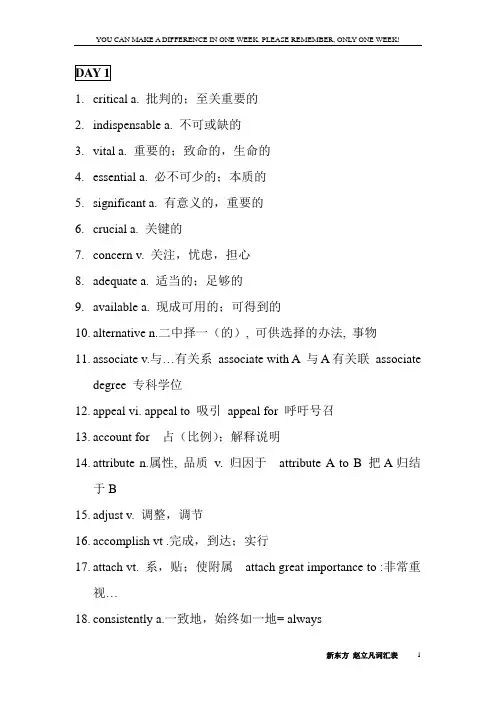
1.critical a. 批判的;至关重要的2.indispensable a. 不可或缺的3.vital a. 重要的;致命的,生命的4.essential a. 必不可少的;本质的5.significant a. 有意义的,重要的6.crucial a. 关键的7.concern v. 关注,忧虑,担心8.adequate a. 适当的;足够的9.available a. 现成可用的;可得到的10.alternative n.二中择一(的), 可供选择的办法, 事物11.associate v.与…有关系associate with A 与A有关联associatedegree 专科学位12.appeal vi. appeal to 吸引appeal for 呼吁号召13.account for 占(比例);解释说明14.attribute n.属性, 品质v. 归因于attribute A to B 把A归结于B15.adjust v. 调整,调节16.accomplish vt .完成,到达;实行17.attach vt. 系,贴;使附属attach great importance to :非常重视…18.consistently a.一致地,始终如一地= always19.cope vi. (+ with) (成功地)应付,处理20.cater to vi.迎合…(胃口,口味)21.constant a. 不变的,恒定的mit vt. 犯(错误,罪行等),干(坏事等)mitment 责任,义务,承诺24.decline v. 拒绝,谢绝;下降(抽象事物、数字)25.distinguish vt. 区分,辨别26.dispose vi. 除掉;处置;解决;处理(of)27.derive vt. 取得,得到;(+from)起源于,来源于28.deprive vt. 剥夺(权利)+ of29.diverse a. 不同的,多种多样的diversity of culture 文化的多样性30.estimate n. /vt. 估计,估量31.extinguish vt. 灭火,浇灭= put out32.extinction n. 灭绝(物种)= dying out33.evaluate vt. 评估,评价34.exclusive a. 独有的,排他的+ news 独家新闻35.eliminate v. 消除,排除= get rid of36.fulfill v. 完成,满足,实践= bring sth to an end/ satisfy 成就感:sense of fulfillment37.generate vt. 生成,产生(光、热、电等)38.guarantee vt. /n. 保证39.highlight vt. 强调,突出highlights:闪光点,突出的特点40.horizon n. 地平线broaden one’s horizons = widen one’s view= open one’s eye 拓宽视野41.initiate vt. 开始,开启= start42.initial a.最初的initially=at the beginning43.initiative n. 主动性,主动精神(第一个吃螃蟹的人所具备的特质)44.inevitable a. 不可避免的45.investigation n. 调查(找出事实背后真相)46.survey n. /vt. 调查(数据,问卷方面)47.sophisticated a. (人)圆滑世故的,老练的;(机器)精密的48.innocent a. 很傻很天真的,无辜的49.manufacture vt. /n. 制造,加工50.mutual a. 相互的mutual understanding 相互理解51.motivate vt. 激励,激发52.activate vt. 激活,使活跃53.shift v. 转移;转动;转变shift from A to B 从A转移到B54.substantial a. 可观的;牢固的;实质的55.stimulate vt. 刺激,激励56.remarkable a. 值得注意的,异常的,非凡的57.remedy n. /vt. 补救,医治,治疗58.reputation n. 名气,声誉fame59.reluctant a. 不情愿的,勉强的60.relief n. 轻松,宽慰;减轻61.reject vt. 拒绝62.reveal vt. 揭露,表明= suggest63.reserve v. 预留(table/room/ticket)64.preserve v. 保护,保存,保持,维持65.demontraste vt. 表明66.previous a. 先,前,以前的67.priority n. 优先,重点68.principal a. 最重要的n. 负责人,校长69.phenomenon n. 现象70.peak n. 山峰,顶点71.prevail vi. 流行,盛行prevalent 流行的72.species n. 物种73.starvation n. 饥饿,饿死74.subject n. 学科,被研究对象75.yield vi. (to)屈服于;让出,放弃n. 产量76.vain a. 徒劳的,无效的be in vain77.vanish vi. 消失,消逝78.via 经由,经过,通过79.volunteer n. 志愿者v. 自愿(做)80.unique a. 唯一的,独特的81.adopt v. 收养;采用;采纳82.adapt vi. 适应,适合;改编,改写vt. 使适应83.adhere vi. 粘附;遵守,坚持+ to84.apparent a. 显然的,明白的(同义obvious/evident)85.appropriate a. 适当的86.ban vt. 取缔,禁止87.equivalent a. 相等的a. 相等物88.extraordinary a. 不平常的,特别的,非凡的89.evolve v.演变evolution n. 演变,进化90.conservation n. 保存,保护91.conservative a. 保守的92.confuse vt. 使困惑,迷惑93.consequence n. 结果,后果94.contrary n. 相反on the contrary = in contrast 正好相反95.controversial a. 有争议的96.consist vt. 由…组成+ of97.resist vt. 抵制,抵抗98.insist vt. 坚持,坚决认为+ on99.persist vt. 坚持(长期)+ in100.persistence n. 毅力,坚持力101.negative a. 否定的,消极的102.positive a. 肯定的,积极的103.neutral a. 中立的104.indifferent a. 冷漠、漠然的105.approving a. 同意,支持的106.biased a. 有偏见的107.prejudiced a. 有偏见的108.neglect vt. 忽视,忽略(无意)109.ignore vt. 忽视,忽略(有意)110.transform v. 转变,变革;变换n. transformation 111.transmit v. 传播,播送;传递n. transmission 112.transfer v. 转移,调任(人员)113.transplant v. 移植114.transition n. 过渡transitional period 过渡期115.sensitive a. 敏感到,灵敏的116.stem n. 茎(植物)vi. (+from) 起源于,来源于117.severe a. 严重的118.appropriate adj.适当的119.alter v. 改变,改动,变更120.accelerate vt. 加速,促进= speed up121.acknowledge v. 承认;致谢122.atmosphere n. 大气层;气氛123.career n. 生涯,职业124.caution n. 小心,谨慎125.cultivate vt. 培养,培育126.capability n.(实际)能力, 性能, 容量, 接受力127.confirm v. 确认,确定128.circulate v. 循环,流通circulation129.collide v. 碰撞,冲突collisionpetent a. 有能力的,能胜任的131.decent a. 像样的,体面的132.delicate a. 易碎的;娇弱的;精美的(花瓶、林黛玉)133.ethic n. 道德,伦理134.ethnic a. 种族,民族的135.emphasize vt. 强调,着重136.external a. 外部的,外表的,外面的137.internal a. 内部的,里面的138.extent n. 程度,范围,大小,限度139.descend v. 下来,下降descendant 子孙后代140.deserve vt. 应受,应得,值得141.destructive adj. 破坏性的142.deliberate adv. 故意的143.fossil n. 化石fossil fuel 指的是(石油天然气等能源)144.pursue vt. 追逐;追求145.prosperous a. 繁荣的146.legislation n.立法, 法律的制定(或通过)147.object n. 物体v. 反对object to sth = oppose sth148.opponent n. 敌手,对手149.subjective a. 主观的150.objective a. 客观的;目标= goal/aim151.obtain v. 获得,达到152.origin n. 起源,出身original 最初的153.release vt. /n. 释放,排放;解释解脱154.react v.反应reaction = response 化学反应:chemical reaction155.reflect v. 反映出,反射156.regardless of 不管…157.tremendous a. 巨大的;精彩的158.temptation n. 诱惑,引诱159.unique a.独一无二的160.ultimate a. 极端的,最大的,最终的161.awful a. 极坏的,威严的,可怕的162.awkward a. 笨拙的,棘手的163.awesome a. 极好的164.abundant a. 丰富的,充裕的,大量的165.barrier n. 障碍;棚栏166.bachelor n. 学士,学士学位;单身汉167.budget n. 预算v. 编预算pensation n. 赔偿,补偿169.candidate n. 候选人parative a. 比较的,相对的171.explode v. 爆炸;爆发;激增172.exploit v. 剥削;利用,开采173.explore v. 勘探174.fundamental a. 基本的,基础的175.fascinate vt. 迷住,吸引住…fascinating 迷人的,吸引人的176.professional a. 职业的,专业的177.illustrate vt. 图示,表明178.involve vt. 包括,使参与,使卷入179.indicate vt. 指示,表明180.issue n. 问题(争论);发行181.interfere v. 干涉,干扰,妨碍182.interpersonal a. 人际的183.interval n. 间隔时间,空隙=break184.interpret v. 口译,解释185.infer v. 推论,推断186.imply v. 暗示,推断implicationunch vt. 发动,发起188.leisure n. 闲暇;悠闲189.legislation n. 法律,法规;立法190.likelihood n. 可能,可能性191.present a. 在场的v. 呈现present confidence 表现出自信192.perspective n. 观点,见解,角度see things from different perspectives 从不同角度看问题193.personnel n. [总称] 人员,员工;人事部门194.shrink vi.收缩;缩水;变小195.subsequent a. 随后的,后来的= what’s next = what follows196.illusion n. 错觉197.individual a. 个别的,单独的n. 个人,个体198.impose vt. 把...加强(on);采用,利用199.expose vt. 暴露expose sth to …200.enhance vt.提高, 增强v.提高201.encounter vt. /n. 遭遇,遭到202.embarrass vt.使困窘, 使尴尬203.religion n. 宗教,宗教信仰204.radical a.根本的;激进的205.tension n. 紧张(状态),张力206.tense a. 紧张的v. 拉紧n. 时态207.tolerant a. 容忍的208.substitute n. 代用品vt. 代替replace A with B = substituteB for A = 用B替代A209.constitute vt. 组成,构成210.institute vt./n. 构成、建立/ 机构,学院211.automatic a. 自动的212.beforehand ad. 预先,事先= in advance213.continuous a. 继续的,连续(不断)的214.calculate vt. 计算,核算215.discrimination n. 歧视racial/sexual discrimination216.distinction n.区别, 差别, 不同点217.distract v.转移distract one’s attention from = draw one’s attention away from …分心218.offend v. 冒犯,触犯offensive 冒犯人的219.potential 2 adj.潜在的, n. 潜能,潜力220.provision n给养,准备,供应的东西= something provided 221.prior a. 优先的,在前的priortiy 优先权222.ruin v. 毁坏,破坏n. 毁灭,[pl.]废墟223.remote a. 遥远的,偏僻的224.secure a. 安全的,可靠的vt. 锁住,固定住 e.g. secure happiness225.security n. 安全,保障226.fantastic a. 极好的(梦幻般的)227.fabulous a. 华丽的,极好的(神话般的)228.incredible a. 难以置信的= unbelievable229.amazing a. 极好的(让人惊奇的)230.terrific a. 极好的(好得令人恐怖的)231.gorgeous a. 极好的,华丽的,高雅的(高级死了)232.spectacular a. 引人注目的,吸引人的233.marvelous a. 奇迹般的,惊人的234.undergraduate 本科的undergraduate student 本科生postgraduate student 硕士研究生235.universal a. 普遍的,通用的;宇宙的236.vacant a. 空的,未占用的vacancy 空缺岗位237.vacuum a./n. 真空的,真空吸尘器238.vivid a. 生动的239.victim n. 牺牲品,受害者240.valid a. 有效的,有根据的;正当的241.abandon vt. 抛弃,放弃242.ambition n. 雄心,野心a. ambitious 有雄心的243.access n./vt. 进入,准入244.accumulate vt. 积累245.addict n. 上瘾的人vi. 是上瘾be addicted to = be crazy about246.alert a. 警觉的;警惕的247.alien n. 外族人,外星人a. 外来的248.amusement n. 娱乐249.aware a. 意识到be aware of sth250.architecture n. 建筑学251.domestic a. 本国的,国内的;家用的;家庭的252.distribution vt. 分发,分配= allocation 253.entertainment n. 娱乐;招待,款待254.enthusiasm n. 热情,热心= passion255.entitle vt. 给...权利,给...资格+ to256.exaggerate v. 夸大,夸张257.fate n. 命运258.fatal a. 致命的;重大的259.facility n. [pl.] 设备,设施;便利,方便260.faculty n. (学校里)全体教员;能力,技能261.fertile a. 肥沃的;多产的262.integrate v. (into, with) (使)成为一体,(使)合并263.inspect v. 检查,检疫inspection264.harmony n. 和谐,融洽265.hostile a. 敌对的,敌意的266.massive a. 大的,大量的,大块的267.moral a. 道德上的,有道德的n. morality268.temporary a. 暂时的,临时的269.prospect n. 前景,前途;景象270.prosperity n.兴旺,繁荣n. prosperity 271.prominent a. 突出的= outstanding 272.prompt vt. 促使a. 敏捷的,及时的273.passive a. 被动的,消极的274.portable a. 手提式的275.respectful a. 充满尊敬之情的276.respectable a. 令人尊敬的277.respective a. 各自的,分别的278.reliable a. 可靠的279.relieve v. 减轻,缓解280.relevant a. 有关的,切题的281.reliable a. 可靠的282.reinforce vt. 增强,加强283.rigid a. 严格的;严酷的284.resume v. (中断后)重新开始;恢复285.survive vt. 生存,幸存286.strategy n. 战略,策略287.signature n. 签名288.approximate a. 大概的,大约=about 289.arouse vt. 引起,激起;唤醒290.arise vi. 产生,出现,发生;起身+ from291.appoint vt. 任命,委派】292.approach v. 靠近n. 途径,方式293.barrier n. 障碍,壁垒294.boost v. 促进,刺激增长295.casual a. 偶然的,碰巧的;临时的;非正式的casual decision 草率的决定296.crash v./n. 撞碎,粉碎,空难air crash297.depress vt.使沮丧, 使消沉depression 沮丧,萧条(经济)298.dedicate vt.献(身), 致力于dedicate to…299.episode n. 插曲,片段300.maximize a. 最大化301.minimize a. 最小化302.majority 大多数 a majority of303.minority 少数minorities 少数民族304.retain vt. 保留,保持305.sponsor n. 发起者,主办者vt. 发起,主办,资助306.spur n. /vt. 刺激,激励307.triumph n. 胜利,成功308.tuition n. 学费309.tremble vi. 颤抖310.undergo v. 经历,遭受311.utter vt. 说出a. 完全的,彻底的312.welfare n. 福利313.witness n. 目击者;证据vt. 注意到;证明314.withdraw v. 收回,撤销315.violent a. 暴力的316.volcano n. 火山317.vulnerable a. 脆弱的,易受伤害的318.variation n. 变化,变动319.vigorous a. 精力旺盛的(同义)enegetic/ dynamic 320.virus n. 病毒321.abnormal a. 反常的322.accuse vt. 控告,责备accuse sb of sth323.abolish v. 废除= do away with …324.aggressive a. 咄咄逼人的,侵略性的325.appliance n. 器具,器械home appliance 家电326.deposit n. 存款,定金v.存放,储蓄327.conquer vt. 征服328.consent n. 准许,同意vi (to) 准许,同意329.conflict n.斗争, 冲突vi.抵触, 冲突330.convince vt.使确信, 使信服convince sb of sth 使某人相信…331.crime n. 罪criminal n. 罪犯332.coincident a. 巧合的333.dominate v.支配, 占优势dominant 占主导优势的334.defect n. 缺点,缺陷defective 有缺陷的335.destruction n.破坏, 毁灭336.defendant n. 被告337.deadline n. 最后期限338.deceive v. 欺骗339.desperate a. 绝望的340.dicard v. / n. 抛弃,抛弃物,垃圾341.dispute v. 争论,争吵342.dramatic a. 戏剧性的,程度巨大的343.durable a. 耐用的,持久的344.duration n. 持续,持续期间345.erect a. 竖直的v. 建造,竖立346.exceed vt. 超过,越出347.erupt v. 爆发(火山)eruption348.emit v. 排放(尾气,废物)emission349.evacuate v. 疏散、撤离(人员在灾难中)350.emigrate 移民(向外)351.immigrate 移民(向里)352.invade v. 侵入,侵略,侵袭353.exclude vt. 把...排斥在外,不包括(反义)include 354.expel v. 驱逐,开除,赶出355.faulty a. 有错误的,有缺点的356.fatigue n. 疲劳,劳累357.infect v. 传染358.immune a. 免疫的359.ingredient n. 组成部分360.inhabitant n. 居民361.flexible a. 易弯曲的362.flock n. 羊群,(鸟兽等)一群;一伙人363.finite a. 有限的364.infinite a. 无限的365.guilty a. 内疚的;有罪的366.junior a. 年少的;资历较浅的367.justify v. 证明…是公正,合理的The fine quality of the cloth justifies its high price. 布的质量好,价格高是应该的。
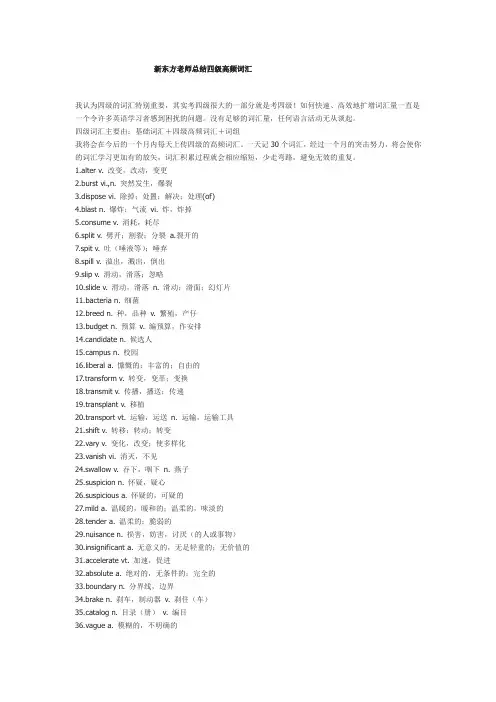
新东方老师总结四级高频词汇我认为四级的词汇特别重要,其实考四级很大的一部分就是考四级!如何快速、高效地扩增词汇量一直是一个令许多英语学习者感到困扰的问题。
没有足够的词汇量,任何语言活动无从谈起。
四级词汇主要由:基础词汇+四级高频词汇+词组我将会在今后的一个月内每天上传四级的高频词汇。
一天记30个词汇,经过一个月的突击努力,将会使你的词汇学习更加有的放矢,词汇积累过程就会相应缩短,少走弯路,避免无效的重复。
1.alter v. 改变,改动,变更2.burst vi.,n. 突然发生,爆裂3.dispose vi. 除掉;处置;解决;处理(of)4.blast n. 爆炸;气流vi. 炸,炸掉5.consume v. 消耗,耗尽6.split v. 劈开;割裂;分裂a.裂开的7.spit v. 吐(唾液等);唾弃8.spill v. 溢出,溅出,倒出9.slip v. 滑动,滑落;忽略10.slide v. 滑动,滑落n. 滑动;滑面;幻灯片11.bacteria n. 细菌12.breed n. 种,品种v. 繁殖,产仔13.budget n. 预算v. 编预算,作安排14.candidate n. 候选人15.campus n. 校园16.liberal a. 慷慨的;丰富的;自由的17.transform v. 转变,变革;变换18.transmit v. 传播,播送;传递19.transplant v. 移植20.transport vt. 运输,运送n. 运输,运输工具21.shift v. 转移;转动;转变22.vary v. 变化,改变;使多样化23.vanish vi. 消灭,不见24.swallow v. 吞下,咽下n. 燕子25.suspicion n. 怀疑,疑心26.suspicious a. 怀疑的,可疑的d a. 温暖的,暖和的;温柔的,味淡的28.tender a. 温柔的;脆弱的29.nuisance n. 损害,妨害,讨厌(的人或事物)30.insignificant a. 无意义的,无足轻重的;无价值的31.accelerate vt. 加速,促进32.absolute a. 绝对的,无条件的;完全的33.boundary n. 分界线,边界34.brake n. 刹车,制动器v. 刹住(车)35.catalog n. 目录(册)v. 编目36.vague a. 模糊的,不明确的37.vain n. 徒劳,白费38.extinct a. 绝灭的,熄灭的39.extraordinary a. 不平常的,特别的,非凡的40.extreme a. 极度的,极端的n. 极端,过分41.agent n. 代理人,代理商;动因,原因42.alcohol n. 含酒精的饮料,酒精43.appeal n./vi. 呼吁,恳求44.appreciate vt. 重视,赏识,欣赏45.approve v. 赞成,同意,批准46.stimulate vt. 刺激,激励47.acquire vt. 取得,获得;学到48.accomplish vt .完成,到达;实行work n. 网状物;广播网,电视网;网络50.tide n. 潮汐;潮流51.tidy a. 整洁的,整齐的52.trace vt. 追踪,找到n. 痕迹,踪迹53.torture n./vt. 拷打,折磨54.wander vi. 漫游,闲逛55.wax n. 蜡56.weave v. 织,编57.preserve v. 保护,保存,保持,维持61. abuse v. 滥用,虐待;谩骂62. academic a. 学术的;高等院校的;研究院的63. academy n. (高等)专科院校;学会64. battery n. 电池(组)65. barrier n. 障碍;棚栏66. cargo n. (船、飞机等装载的)货物67. career n. 生涯,职业68. vessel n. 船舶;容器,器皿;血管69. vertical a. 垂直的70. oblige v. 迫使,责成;使感激71. obscure a. 阴暗,模糊72. extent n. 程度,范围,大小,限度73. exterior n. 外部,外表a. 外部的,外表的74. external a. 外部的,外表的,外面的75. petrol n. 汽油76. petroleum n. 石油77. delay vt./n. 推迟,延误,耽搁78. decay vi. 腐烂,腐朽79. decent a. 像样的,体面的80. route n. 路;路线;航线81. ruin v. 毁坏,破坏n. 毁灭,[pl.]废墟82. sake n. 缘故,理由83. satellite n. 卫星84. scale n. 大小,规模;等级;刻度85. temple n. 庙宇86. tedious a. 乏味道,单调的,87. tend vi.易于,趋向88. tendency n.趋向,趋势89. ultimate a. 极端的,最大的,最终的n. 极端90. undergo v. 经历,遭受91. abundant a. 丰富的,充裕的,大量的92. adopt v. 收养;采用;采纳93. adapt vi. 适应,适合;改编,改写vt. 使适应94. bachelor n. 学士,学士学位;单身汉95. casual a. 偶然的,碰巧的;临时的;非正式的96. trap n. 陷阱,圈套v. 设陷阱捕捉97. vacant a. 空的,未占用的98. vacuum n. 真空,真空吸尘器99. oral a. 口头的,口述的,口的100. optics n. (单、复数同形)光学101. organ n. 器官,风琴102. excess n. 过分,过量,过剩103. expel v. 驱逐,开除,赶出104. expend v. 消费105. expenditure n. 支出,消费;经费106. expense n. 开销,费用107. expensive a. 花钱多的;价格高贵的108. expand v. 扩大,扩张;展开,膨胀109. expansion n. 扩大,扩充;发展,膨胀110. private a. 私人的,个人的111. individual a. 个别的,单独的n. 个人,个体112. personal a. 个人的,私人的;亲自的114. personnel n. [总称]人员,员工;人事部门115. the Pacific Ocean 太平洋116. the Atlantic Ocean 大西洋117. the Arctic Ocean 北冰洋118. the Antarctic Ocean 南冰洋119. grant vt. 授予,同意,准予119. grand a. 宏伟大,壮丽的,重大的120. invade v. 侵入,侵略,侵袭121. acid n. 酸,酸性物质a. 酸的;尖刻的122. acknowledge v. 承认;致谢123. balcony n. 阳台124. calculate vt. 计算,核算125. calendar n. 日历,月历126. optimistic a. 乐观127. optional a. 可以任选的,非强制的128. outstanding a. 杰出的,突出的,显著的129. export n. 出口(物)v. 出口,输出130. import n. 进口(物)v. 进口,输入131. impose vt. 把...加强(on);采用,利用132. religion n. 宗教,宗教信仰133. religious a. 宗教的134. victim n. 牺牲品,受害者135. video n. 电视,视频a. 电视的,录像的136. videotape n. 录像磁带v. 把...录在录像带上137. offend v. 冒犯,触犯138. bother v. 打搅,麻烦139. interfere v. 干涉,干扰,妨碍140. internal a. 内部的,国内的141. beforehand ad. 预先,事先142. racial a. 人种的种族的143. radiation n. 放射物,辐射144. radical a.根本的;激进的145. range n. 幅度,范围v. (在某范围内)变动146. wonder n. 惊奇,奇迹v. 想知道,对...感到疑惑147. isolate vt. 使隔离,使孤立148. issue n. 问题,争论点;发行,(报刊)一期149. hollow a. 空的,中空的,空虚道150. hook n. 钩vt. 钩住151. adequate a. 适当地;足够152. adhere vi. 粘附,附着;遵守,坚持153. ban vt. 取缔,禁止154. capture vt. 俘虏,捕获155. valid a. 有效的,有根据的;正当的156. valley n. 山谷,峡谷157. consistent a. 坚固定;一致的,始终如一的158. continuous a. 继续的,连续(不断)的159. continual a. 不断地,频繁的160. explode v. 爆炸;爆发;激增161. exploit v. 剥削;利用,开采162. explore v. 勘探163. explosion n. 爆炸;爆发;激增164. explosive a. 爆炸的;极易引起争论的165. remote a. 遥远的,偏僻的166. removal n. 除去,消除167. render vt. 使得,致使167. render 解释比较长,可要仔细体会啊!1. render sth(for sth) ;rendersth (to sb) give sth in return,or exchange,or as sth which is due 给予某物作为报偿或用以交换;回报;归还render homage,obedience,allegiance,etc.表示敬意、顺从、效忠等:a reward for services rendered 服务的酬金render good for evil 以德报怨render insult for insult 以侮辱对侮辱render sb a service/render a service to sb 为某人服务render help to disaster victims 向灾民提供援助render thanks to God 感谢上帝2. present or send in (an account)for payment 递交或开出(帐单):account rendered $50 开出50美元的帐单3. cause (sb/sth) to be in a certain condition 使(某人[某事物])处于某种状况:rendered helpless by an accident 因出事故而束手无策Your action had rendered our contract invalid.你们的这种做法导致双方的合同失败。
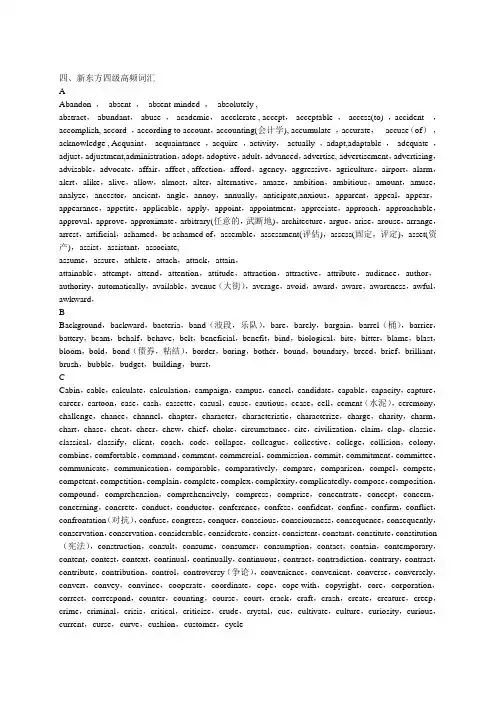
四、新东方四级高频词汇AAbandon ,absent ,absent-minded ,absolutely ,abstract,abundant,abuse ,academic,accelerate , accept,acceptable ,access(to) ,accident ,accomplish, accord ,according to account,accounting(会计学), accumulate ,accurate,accuse(of),acknowledge , Acquaint,acquaintance ,acquire ,activity,actually ,adapt,adaptable ,adequate ,adjust,adjustment,administration,adopt,adoptive,adult,advanced,advertise, advertisement,advertising,advisable,advocate,affair,affect , affection,afford,agency,aggressive,agriculture,airport,alarm,alert,alike,alive,allow,almost,alter,alternative,amaze,ambition,ambitious,amount,amuse,analyze,ancestor,ancient,angle,annoy,annually,anticipate,anxious,apparent,appeal,appear,appearance,appetite,applicable,apply,appoint,appointment,appreciate,approach,approachable,approval,approve,approximate,arbitrary(任意的,武断地),architecture,argue,arise,arouse,arrange,arrest,artificial,ashamed,be ashamed of,assemble,assessment(评估),assess(固定,评定),asset(资产),assist,assistant,associate,assume,assure,athlete,attach,attack,attain,attainable,attempt,attend,attention,attitude,attraction,attractive,attribute,audience,author,authority,automatically,available,avenue(大街),average,avoid,award,aware,awareness,awful,awkward,BBackground,backward,bacteria,band(波段,乐队),bare,barely,bargain,barrel(桶),barrier,battery,beam,behalf,behave,belt,beneficial,benefit,bind,biological,bite,bitter,blame,blast,bloom,bold,bond(债券,粘结),border,boring,bother,bound,boundary,breed,brief,brilliant,brush,bubble,budget,building,burst,CCabin,cable,calculate,calculation,campaign,campus,cancel,candidate,capable,capacity,capture,career,cartoon,case,cash,cassette,casual,cause,cautious,cease,cell,cement(水泥),ceremony,challenge,chance,channel,chapter,character,characteristic,characterize,charge,charity,charm,chart,chase,cheat,cheer,chew,chief,choke,circumstance,cite,civilization,claim,clap,classic,classical,classify,client,coach,code,collapse,colleague,collective,college,collision,colony,combine,comfortable,command,comment,commercial,commission,commit,commitment,committee,communicate,communication,comparable,comparatively,compare,comparison,compel,compete,competent,competition,complain,complete,complex,complexity,complicatedly,compose,composition,compound,comprehension,comprehensively,compress,comprise,concentrate,concept,concern,concerning,concrete,conduct,conductor,conference,confess,confident,confine,confirm,conflict,confrontation(对抗),confuse,congress,conquer,conscious,consciousness,consequence,consequently,conservation,conservation,considerable,considerate,consist,consistent,constant,constitute,constitution (宪法),construction,consult,consume,consumer,consumption,contact,contain,contemporary,content,contest,context,continual,continually,continuous,contract,contradiction,contrary,contrast,contribute,contribution,control,controversy(争论),convenience,convenient,converse,conversely,convert,convey,convince,cooperate,coordinate,cope,cope with,copyright,core,corporation,correct,correspond,counter,counting,course,court,crack,craft,crash,create,creature,creep,crime,criminal,crisis,critical,criticize,crude,crystal,cue,cultivate,culture,curiosity,curious,current,curse,curve,cushion,customer,cycleDam,data,deaf,deal,debate,decade,deceive,decent,declare,decline,decorate,decrease,defect,define,definite,definition,delay,delegate,deliberate,delicate,deliver,delivery,demand,democracy,democratic,demonstrate,dense,deny,depart,dependent,depress,depression,derive,desert,deserve,desirable,desire,despair,despite,destination,destroy,destruction,detail,detect,determination,developing,device,devote,diagram,dial,diet,differ,dim,dinner,direction,disappointment,discard,discharge,discipline,discourage,dislike,dismiss,disorder,disappear,display,dispose,dispute,dissolve,distance,distinct,distinction,distinguish,distress,distribute,disturb,dive,diverse,division(部门),divorce,document,domestic,donation,dot,doubtful,downward,draft,dramatic,drift,drop,drum,dump,durable,dynamic,EEarn,earthquake,ease,economic,economics,economical,economy,edge,edition,editorial,educate,effect,effective,efficient,effort,elaborate(精致的),elderly,elect,electrical,electronic,elevator,eliminate,embarrass,emerge,emergency,emotion,emotional,emphasize,employ,employee,employer,employment,enable,enclose,encounter,encourage,endure,enforce,engage,engine,engineer,engineering,enhance,enlighten(启蒙,启发),enormous,ensure,enterprise,entertain,enthusiasm,entitle,environment,environmental,envy,episode,equal,equality,equip,equivalent,erect,error,especially,essay,essential,essentially,establish,estate,estimate,evaluate,event,eventual,eventually,evidence,evident,evolution,exaggerate,exceed,except,exception,excess,excessive,exchange,exclusively,excursion(远足,短途旅行),executive,exert,exhaust,exhibition,exit,expand,expansion,expansive,expense,experience,expert,explode,exploit,explore,export,expose,exposure,extend,extension,extensive,extent,external,extra,extraordinary,extreme,extremely,eyesight,FFabric,facility,factor,fade,failure,faint,faith,false,fame,famine(饥荒),fancy,fare,fashion,fasten,fatal,fatigue,favor,in favor of,favorable,feasible,feature,federal,fee,feedback,feeling,female,fiction,fierce,figure,finally,finance,financial,finish,fitness,fixed,flash,flat,fleet,flexible,fluent,fluid,focus,forbid,forceful,forecast,formal,format,former,fortnight,foundation,fraction(片断,分数),frank,freedom,frequency,fresh,frontier,frustrate,fry,fuel,fulfill,function,fund,fundamentally,furnish,further,furthermore,GGain,gallery,gap,generate,generous,genius,genuine,geography,gesture,giant,glimpse,glove,goal,graceless(粗俗的),graduate,grant,grasp,gratitude,gravity,greedy,gross,growth,guarantee,guidance,guilty,HHalt,handful,handle,handy,hardly,hardware,harsh,hatred,hazard,headline,headquarter,heel,heighten,helicopter,hence,hero,hesitate,historical,hit,hollow,hook,horizon,hostile,household,huge,IIdeal,identify,identity,idle,idleness,ignorance,ignore,illegal,illness,illustrate,image,imitate,immediately,immense,immigrant,impact,imply,import,impose,impress,impression,impressive,improve,in order to,in relation to,in view of,inability,inadequate,incapable,incident,incline,include,incomplete,increase,incredible,indifferent,indispensable,individual,individuality,industry,inefficient,inevitable,inevitably,inexperience,infant,infect,inferior,infinite,influence,influential,inform(of/about),information,inhabitant,inherit,initial,initiative,injure,innocent,inquire,insecure,insensible,insert,insight,insignificant,insignificantly,inspire,install,instant,instinct,institute,institution,instrument,,insure,intellectual,intelligence,intelligent,intend,intensive,intention,intentional,interaction,interfere,interference,intermediate,internal,interpret,interval,interview,intimate,invade,invest,investigate,invisible,invite,involve,involvement,isolate,issue,item,JJail,jam,jealous,joint,journal,journalist,judge,judgement(judgment),justice,justify,KKnowledge,LLabel,lack,lag,lane,largely,launch,laundry,lawn,layer,laziness,lead,leader,leadership,leak,leap,lecture,legal,length,lengthen,lest,liable,liberal,liberal art,license,lightning,likely,likewise,liking,limit,literate,literature,loaf,loan,local,locate,lodger(寄宿者),lonely,loosen,loyalty,lump,luxury,MMachinery,magazine,magic,magnetic,mainly,maintain,maintenance,major,male,manner,manual,manually,manufacture,margin,mature,maximum,measure,media,medical,medium,mental,mere,merit,mess,metric(米制的,公制的),mild,minimum,ministry,miserable,mislead,mission,mistake,mistreat,misunderstand,mobile,model,modest,modify,moist,mood,moral,moreover,motion,motivate,motivation,motive,mount,multiply,musician,NNational,native,natural,naturalist,navigation(,navy,nearly,necessarily,necessity,negative,neglect,negotiate,nerve(胆量,勇气),nest,network,neutral,nevertheless,nonsense,normal,normally,noticeable,notion,novel,nuclear,nuisance(讨厌的人或东西),numerous,nylon,OObject,objection,objective,oblige,obligation observation,observe,obstacle,obtain,obvious,occasion,occupy,occurrence,offend,offense,offer,omit,operate,opinion,opponent,opportunity,oppose,optical,optimistic,option,optional,oral,orbit,order,orderly,ordinary,organ,organic,origin,original,otherwise,outcome,outlet,outline,outlook,output,outside,outstanding,outward,overall,overcome,overextend,overlook,overnight,overseas,owing,owing to,ownership,PPace,package,pad,painful。
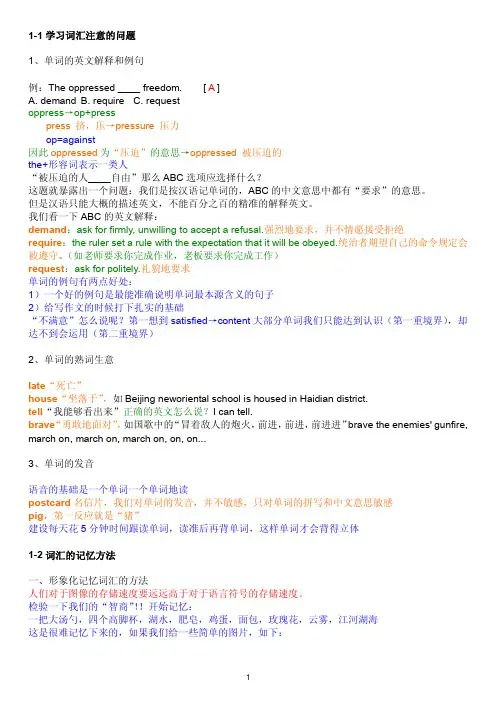

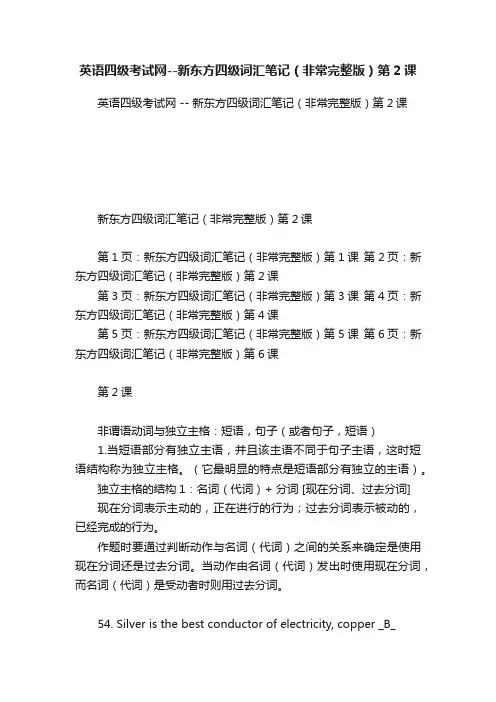
英语四级考试网--新东方四级词汇笔记(非常完整版)第2课英语四级考试网 -- 新东方四级词汇笔记(非常完整版)第2课新东方四级词汇笔记(非常完整版)第2课第1页:新东方四级词汇笔记(非常完整版)第1课第2页:新东方四级词汇笔记(非常完整版)第2课第3页:新东方四级词汇笔记(非常完整版)第3课第4页:新东方四级词汇笔记(非常完整版)第4课第5页:新东方四级词汇笔记(非常完整版)第5课第6页:新东方四级词汇笔记(非常完整版)第6课第2课非谓语动词与独立主格:短语,句子(或者句子,短语)1.当短语部分有独立主语,并且该主语不同于句子主语,这时短语结构称为独立主格。
(它最明显的特点是短语部分有独立的主语)。
独立主格的结构1:名词(代词)+ 分词 [现在分词、过去分词]现在分词表示主动的,正在进行的行为;过去分词表示被动的,已经完成的行为。
作题时要通过判断动作与名词(代词)之间的关系来确定是使用现在分词还是过去分词。
当动作由名词(代词)发出时使用现在分词,而名词(代词)是受动者时则用过去分词。
54. Silver is the best conductor of electricity, copper _B_it closely.A followedB followingC to followD being followed49. All things _A_, the planned trip will have to be calledoff.A consideredB be consideredC consideringD havingconsideredcall off 取消; cancel vt. 取消;四级中的考点就是现在分词和过去分词的区别。
独立主格的结构2:with + 名词(代词)+ 分词 [句子当中作状语]36. After the Arab states won independence, great emphasiswas laid on expanding education, with girls as well as boys _C_ togo to school.A to be encouragedB been encouragedC being encouragedD beencouragedas well as 和(相当于and); be encouraged不会考。
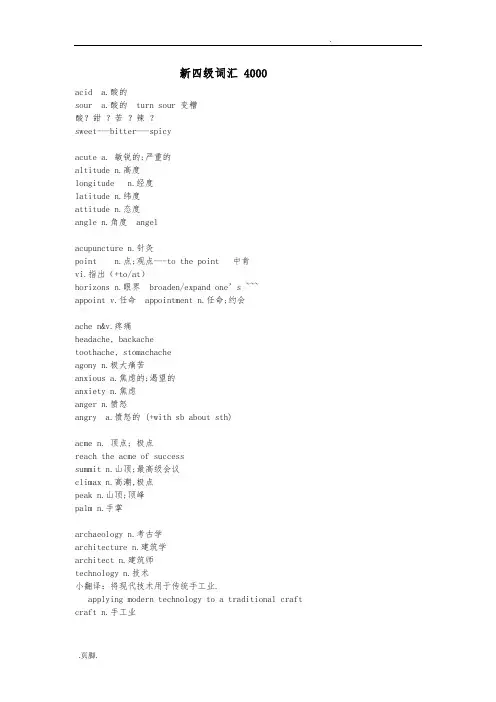
新四级词汇 4000acid a.酸的sour a.酸的 turn sour 变糟酸?甜?苦?辣?sweet---bitter---spicyacute a. 敏锐的;严重的altitude n.高度longitude n.经度latitude n.纬度attitude n.态度angle n.角度 angelacupuncture n.针灸point n.点;观点---to the point 中肯vi.指出(+to/at)horizons n.眼界 broaden/expand one’s ~~~appoint v.任命 appointment n.任命;约会ache n&v.疼痛headache, backachetoothache, stomachacheagony n.极大痛苦anxious a.焦虑的;渴望的anxiety n.焦虑anger n.愤怒angry a.愤怒的 (+with sb about sth)acme n. 顶点; 极点reach the acme of successsummit n.山顶;最高级会议climax n.高潮,极点peak n.山顶;顶峰palm n.手掌archaeology n.考古学architecture n.建筑学architect n.建筑师technology n.技术小翻译:将现代技术用于传统手工业.applying modern technology to a traditional craft craft n.手工业arm n.臂 arms n.武器army n.军队disarm v.解除武装alarm n.警报v.使惊动Alarmed by the noise, the birds flew away. 那声音把鸟吓飞了antique n.古董anticipate v.期待(anti=ante,前的+cip,拿+ate=提前拿的,期待)ancestor n.前辈(an,之前的+cest,cess的变体,走+or,人,走在之前的人=前辈) ancient a.古代的act,ag=do,做act n.行为,举动 v.行动action n.行动active a.活跃的,积极地activity n.活动exact a.精确的;严谨的interact v.相互交流;相互作用transact v.做交易;办理react v.反应,回应agent n.代理人agency n.代理处agenda n.议事日程agitate v.搅动,使焦虑不安agile a.敏捷的,灵巧的audi=hear,倾听audience n.听众audible a.听得到的audit v.旁听;审计 n.审计auditor v.旁听生;审计员auditorium n.观众席stadium n.体育馆forum n.论坛museum n. 博物馆band n.带;一帮 v. 联合(+together)bandage n.绷带abandon v.放弃;抛弃bind v.捆绑,系紧bond n.合同,契约bend v.弯曲bound a. 1.准备去 +for2.一定做 be bound to don.(复数)界限boundary n.边界abundant a.丰富的bundle n.束,包 a bundle of flowersbridge n.桥梁 brief a.简短的branch n.树枝;分支embrace v.拥抱; 包括bank n.河岸; 银行account n.;叙述savings ~~~current ~~~deposit ~~~account for 导致,引起Bad weather accounted for the long delay.take sth into account/consideration 考虑brook n.小溪 v.忍受小翻译:我决不让任何人干预我的事。
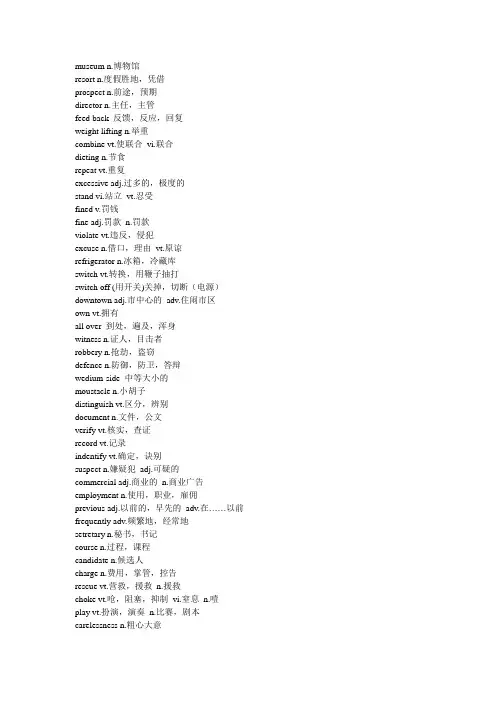
museum n.博物馆resort n.度假胜地,凭借prospect n.前途,预期director n.主任,主管feed back 反馈,反应,回复weight lifting n.举重combine vt.使联合vi.联合dieting n.节食repeat vt.重复excessive adj.过多的,极度的stand vi.站立vt.忍受fined v.罚钱fine adj.罚款n.罚款violate vt.违反,侵犯excuse n.借口,理由vt.原谅refrigerator n.冰箱,冷藏库switch vt.转换,用鞭子抽打switch off (用开关)关掉,切断(电源)downtown adj.市中心的adv.住闹市区own vt.拥有all over 到处,遍及,浑身witness n.证人,目击者robbery n.抢劫,盗窃defence n.防御,防卫,答辩wedium-side 中等大小的moustacle n.小胡子distinguish vt.区分,辨别document n.文件,公文verify vt.核实,查证record vt.记录indentify vt.确定,诀别suspect n.嫌疑犯adj.可疑的commercial adj.商业的n.商业广告employment n.使用,职业,雇佣previous adj.以前的,早先的adv.在……以前frequently adv.频繁地,经常地setretary n.秘书,书记course n.过程,课程candidate n.候选人charge n.费用,掌管,控告rescue vt.营救,援救n.援救choke vt.呛,阻塞,抑制vi.窒息n.噎play vt.扮演,演奏n.比赛,剧本carelessness n.粗心大意tragedy n.悲剧,灾难unbearable adj.难以忍受的recommend vt.介绍,推荐condition n.条件,情况absent-minded adj.心不在焉的,茫然的,神情恍惚的expert adj.熟练的n.行家seeking heads with 与……接轨practice 惯例curren 当下,眼下trend 趋势administrator 管理者enroll 录取president 校长tund-rasing 募集chief 主要top-level 高层fame 声望tuitions 学费operation 管理strict government 严格的政府monotonous adj.单调的revenue n.税收,国家的收入appointed 指派,指定vice-chancellor n.校长,法官strengthen vt.加强,巩固boost 猛增enhance 提升,美化international faculty 关机教员perspective 视角discipline n.学科vt.训练keep pace with 与……保持一致decline n.下降raise 养育live up to expectation 不辜负…….的希望the audacidy of hope 无畏的希望figure 身材public figure 公众人物figure out 指出blog 博客tendtrandsustainable。
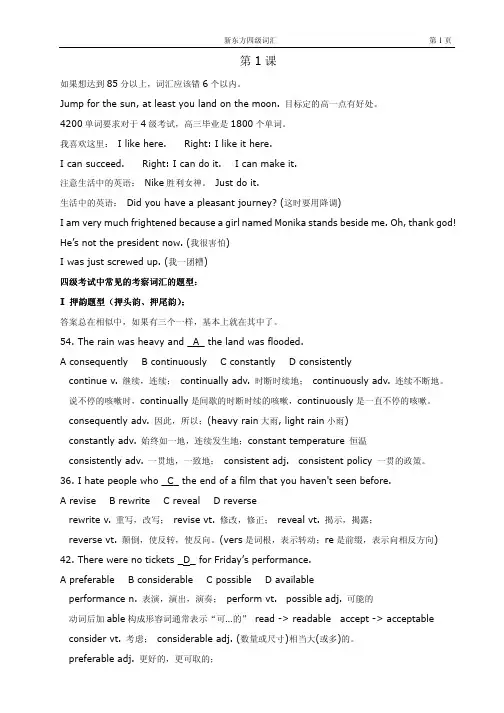
第1课如果想达到85分以上,词汇应该错6个以内。
Jump for the sun, at least you land on the moon. 目标定的高一点有好处。
4200单词要求对于4级考试,高三毕业是1800个单词。
我喜欢这里: I like here. Right: I like it here.I can succeed. Right: I can do it. I can make it.注意生活中的英语: Nike 胜利女神。
Just do it.生活中的英语: Did you have a pleasant journey? (这时要用降调)I am very much frightened because a girl named Monika stands beside me. Oh, thank god! He’s not the president now. (我很害怕)I was just screwed up. (我一团糟)四级考试中常见的考察词汇的题型四级考试中常见的考察词汇的题型::I 押韵题型押韵题型((押头韵押头韵、、押尾韵押尾韵)); 答案总在相似中,如果有三个一样,基本上就在其中了。
54. The rain was heavy and _A_ the land was flooded.A consequentlyB continuouslyC constantlyD consistentlycontinue v. 继续,连续; continually adv. 时断时续地; continuously adv. 连续不断地。
说不停的咳嗽时,continually 是间歇的时断时续的咳嗽,continuously 是一直不停的咳嗽。
consequently adv. 因此,所以;(heavy rain 大雨, light rain 小雨)constantly adv. 始终如一地,连续发生地;constant temperature 恒温consistently adv. 一贯地,一致地; consistent adj. consistent policy 一贯的政策。
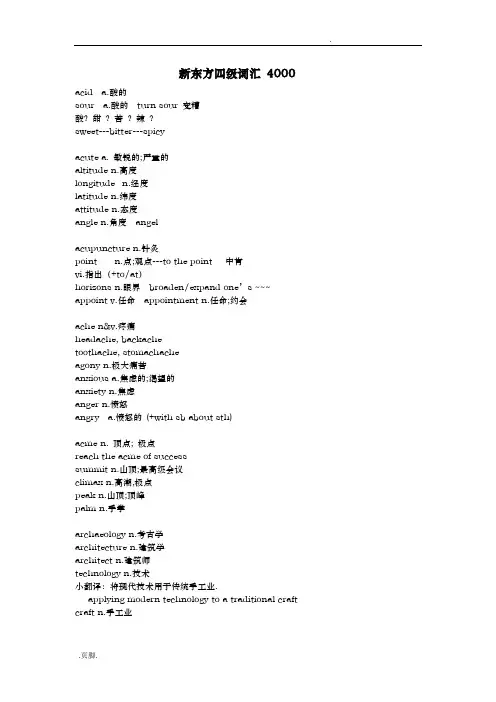
新东方四级词汇4000 acid a.酸的sour a.酸的turn sour 变糟酸?甜?苦?辣?sweet---bitter---spicyacute a. 敏锐的;严重的altitude n.高度longitude n.经度latitude n.纬度attitude n.态度angle n.角度angelacupuncture n.针灸point n.点;观点---to the point 中肯vi.指出(+to/at)horizons n.眼界broaden/expand one’s ~~~ appoint v.任命appointment n.任命;约会ache n&v.疼痛headache, backachetoothache, stomachacheagony n.极大痛苦anxious a.焦虑的;渴望的anxiety n.焦虑anger n.愤怒angry a.愤怒的(+with sb about sth)acme n. 顶点; 极点reach the acme of successsummit n.山顶;最高级会议climax n.高潮,极点peak n.山顶;顶峰palm n.手掌archaeology n.考古学architecture n.建筑学architect n.建筑师technology n.技术小翻译:将现代技术用于传统手工业.applying modern technology to a traditional craft craft n.手工业arm n.臂arms n.武器army n.军队disarm v.解除武装alarm n.警报v.使惊动Alarmed by the noise, the birds flew away. 那声音把鸟吓飞了antique n.古董anticipate v.期待(anti=ante,前的+cip,拿+ate=提前拿的,期待)ancestor n.前辈(an,之前的+cest,cess的变体,走+or,人,走在之前的人=前辈) ancient a.古代的act,ag=do,做act n.行为,举动v.行动action n.行动active a.活跃的,积极地activity n.活动exact a.精确的;严谨的interact v.相互交流;相互作用transact v.做交易;办理react v.反应,回应agent n.代理人agency n.代理处agenda n.议事日程agitate v.搅动,使焦虑不安agile a.敏捷的,灵巧的audi=hear,倾听audience n.听众audible a.听得到的audit v.旁听;审计n.审计auditor v.旁听生;审计员auditorium n.观众席stadium n.体育馆forum n.论坛museum n. 博物馆band n.带;一帮v. 联合(+together)bandage n.绷带abandon v.放弃;抛弃bind v.捆绑,系紧bond n.合同,契约bend v.弯曲bound a. 1.准备去+for2.一定做be bound to don.(复数)界限boundary n.边界abundant a.丰富的bundle n.束,包 a bundle of flowersbridge n.桥梁brief a.简短的branch n.树枝;分支embrace v.拥抱; 包括bank n.河岸; 银行account n.帐户;叙述savings ~~~current ~~~deposit ~~~account for 导致,引起Bad weather accounted for the long delay.take sth into account/consideration 考虑brook n.小溪v.忍受小翻译:我决不让任何人干预我的事。
.alter v. 改变,改动,变更2.burst vi.,n. 突然发生,爆裂3.dispose vi. 除掉;处置;解决;处理(of)4.blast n. 爆炸;气流 vi. 炸,炸掉5.consume v. 消耗,耗尽6.split v. 劈开;割裂;分裂 a.裂开的7.spit v. 吐(唾液等);唾弃8.spill v. 溢出,溅出,倒出9.slip v. 滑动,滑落;忽略10.slide v. 滑动,滑落 n. 滑动;滑面;幻灯片11.bacteria n. 细菌12.breed n. 种,品种 v. 繁产仔13.budget n. 预算 v. 编预算,作安排14.candidate n. 候选人15.campus n. 校园16.liberal a.慷慨的;丰富的;自由的17.transform v. 转变,变革;变换18.transmit v. 传播,播送;传递19.transplant v. 移植20.transport vt. 运输,运送 n. 运输,运输工具21.shift v. 转移;转动;转变22.vary v. 变化,改变;使多样化23.vanish vi. 消灭,不见24.swallow v. 吞下,咽下 n. 燕子25.suspicion n. 怀疑,疑心26.suspicious a. 怀疑的,可疑的d a. 温暖的,暖和的;温柔的,味淡的28.tender a. 温柔的;脆弱的29.nuisance n.损害,妨厌(的人或事物)30.insignificant a. 无意义的,无足轻重的;无价值的31.accelerate vt. 加速,促进32.absolute a. 绝对的,无条件的;完全的33.boundary n. 分界线,边34.brake n. 刹车,制动器 v. 刹住(车)35.catalog n. 目录(册) v. 编目36.vague a. 模糊的,不明确的7.vain n. 38.extinct a. 绝灭的,熄灭的39.extraordinary a. 不平特别的,非凡的40.extreme a.极度的,极端的 n. 极端,过分41.agent n. 代理人,代理商;动因,原因42.alcohol n. 含酒精的饮43.appeal n./vi. 呼吁,恳求44.appreciate vt. 重视,赏识,欣赏45.approve v. 赞成,同意,批准46.stimulate vt. 刺激,激励47.acquire vt. 取得,获得;学到48.accomplish vt .完成,到达;实行work n. 网状物;广播网电视网;网络50.tide n. 潮汐;潮流51.tidy a. 整洁的,整齐的52.trace vt. 追踪,找到 n.痕迹,踪迹53.torture n./vt. 拷打,折磨54.wander vi. 漫游,闲逛55.wax n. 蜡56.weave v.织,编57.preserve v. 保护,保存,保持,维持58.for good永久地59。
四六级高频词分组记忆福州新东方国内部李群Day 11.alter v. 改变,改动,变更讲解:alter一词源于other其他改变,变更就是变成其他扩展1:alternate a.轮流的,交替的al加强tern = turn轮流ate的Key: 元音字母互换词汇学最基本原则例:er = or = ar = ur表示人扩展2:alternative a.二者选其一的alter + native扩展3:unalterable a.无法改变的un否定,不alter改变able可以...的S: Staying home as a housewife is one choice for her and an alternativeoption is to work like a common woman.译文:她要么选择在家做家庭主妇,要么就像普通女人一样工作。
总结:本组需要掌握的词汇alter, alternate, alternative, unalterable2.burst vi. n. 突然发生,爆裂讲解:谐音“爆死他”-- 爆炸,爆裂搭配:burst into tears 爆发出眼泪burst into laughters 爆发出笑声burst into cheers 爆发出欢呼声扩展:bomb n.炸弹blast vi.炸掉n.爆炸,气流,一阵风讲解1:bomb谐音词讲解2:bomb炸弹+ last 持续= 爆炸辨析1:burst指的是突然发生的一个动作或者事情;blast强调是爆炸,炸掉辨析2:bomb炸弹boom繁荣例:economic boom 经济繁荣辨析3:boom n.繁荣bloom v.开花blossom n.花doom n.毁灭doomsday n.世界末日prosperous a.繁荣的讲解:pro = pre向前sper = spir词根气ous形容词后缀spirit = spir + it 气-- 精神一个人有气说明有精神;反之,有气无力说明没精神;所以说“精气神”不可分割词根spir气单词spirit精神pro向前sper气ous的向前吐气的俗话:扬眉吐气-- 繁荣的S: The economic boom in the country made everywhere prosperous and skyscrapers erected like fully-bloomed blossoms; but the Earthquake leftthe place a sight of doom, like it had just suffered from doomsday.译文:这个国家经济繁荣,高楼大厦似遍地花开;但是地震过后,处处是一片死气,仿佛刚遭遇过世界末日一般。
大学英语四级考试高频词汇总结1.alter ['?:lt?] v. 改变,改动,变更2.burst ['b?:e?n] vi.,n. 突然发生,爆裂3.dispose [dis'p?uz] vi. 除掉;处置;解决;处理(of)4.blast [blɑ:st] n. 爆炸;气流 vi. 炸,炸掉5.consume [k?n'sju:m] v. 消耗,耗尽6.split [split] v. 劈开;割裂;分裂 a.裂开的7.spit [spit] v. 吐(唾液等);唾弃8.spill [spil] v. 溢出,溅出,倒出9.slip [slip] v. 滑动,滑落;忽略10.slide [slaid] v. 滑动,滑落 n. 滑动;滑面;幻灯片11.bacteria [b?k'ti?ri?] n. 细菌12.breed [bri:d] n. 种,品种 v. 繁殖,产仔13.budget ['b?d?it] n. 预算 v. 编预算,作安排14.candidate ['k?ndidit] n. 候选人15.campus ['k?mp?s] n. 校园16.liberal ['lib?r?l] a. 慷慨的;丰富的;自由的17.t ransform [tr?ns'f?:m] v. 转变,变革;变换18.transmit [tr?nz'mit] v. 传播,播送;传递19.transplant [tr?ns'plɑ:nt] v. 移植20.transport [tr?ns'p?:t] vt. 运输,运送 n. 运输,运输工具21.shift [?ift] v. 转移;转动;转变22.vary ['v??ri] v. 变化,改变;使多样化23.vanish ['v?ni?] vi. 消灭,不见24.swallow ['sw?l?u] v. 吞下,咽下 n. 燕子25.suspicion [s?s'pi??n] n. 怀疑,疑心26.suspicious [s?'spi??s] a. 怀疑的,可疑的d [maild] a. 温暖的,暖和的;温柔的,味淡的28.tender ['tend?] a. 温柔的;脆弱的29.nuisance ['nju:s?ns] n. 损害,妨害,讨厌(的人或事物)30.insignificant [,?ns?g'n?f?k?nt] a. 无意义的,无足轻重的;无价值的31.accelerate [?k'sel?reit] vt. 加速,促进32.absolute ['?bs?lju:t] a. 绝对的,无条件的;完全的33.boundary ['baund?ri] n. 分界线,边界34.brake [breik] n. 刹车,制动器 v. 刹住(车)35.catalog ['k?t?l?ɡ] n. 目录(册) v. 编目36.vague [veiɡ] a. 模糊的,不明确的37.vain [vein] n. 徒劳,白费38.extinct [iks'ti?kt] a. 绝灭的,熄灭的39.extraordinary [iks'tr?:dn?ri] a. 不平常的,特别的非凡的40.extreme [iks'tri:m] a. 极度的,极端的 n. 极端,过分41.agent ['eid??nt] n. 代理人,代理商;动因,原因42.alcohol ['?lk?,h?l] n. 含酒精的饮料,酒精43.appeal [?'pi:l] n./vi. 呼吁,恳求44.appreciate [?'pri:?ieit] vt. 重视,赏识,欣赏45.approve [?'pru:v] v. 赞成,同意,批准46.stimulate ['stimjuleit] vt. 刺激,激励47.acquire [?'kwai?] vt. 取得,获得;学到48.accomplish [?'k?mpli?] vt .完成,到达;实行work ['netw?:k] n. 网状物;广播网,电视网;网络50.tide [taid] n. 潮汐;潮流51.tidy ['a?dl]a. 整洁的,整齐的52.trace [treis] vt. 追踪,找到 n. 痕迹,踪迹53.torture ['t?:t??] n./vt. 拷打,折磨54.wander ['w?nd?] vi. 漫游,闲逛55.wax [w?ks] n. 蜡56.weave [wi:v] v. 织,编57.preserve [pri'z?:v] v. 保护,保存,保持,维持61. abuse [?'bju:s] v. 滥用,虐待;谩骂62. academic [,?k?'demik] a. 学术的;高等院校的;研究院的63. academy [?'k?d?mi] n. (高等)专科院校;学会64. battery ['b?t?ri] n. 电池(组)65. barrier ['b?ri?] n. 障碍;棚栏66. cargo ['kɑ:ɡ?u] n. (船、飞机等装载的)货物67. career [k?'ri?] n. 生涯,职业68. vessel ['ves?l] n. 船舶;容器,器皿;血管69. vertical ['v?:tik?l] a. 垂直的70. oblige [?'blaid?] v. 迫使,责成;使感激71. obscure [?b'skju?] a. 阴暗,模糊72. extent [iks'tent] n. 程度,范围,大小,限度73. exterior [eks'ti?ri?] n. 外部,外表 a. 外部的,外表的74. external [eks't?:nl] a. 外部的,外表的,外面的75. petrol ['petr?l] n. 汽油76. petroleum [pi'tr?uli?m] n. 石油77. delay [di'lei] vt./n. 推迟,延误,耽搁78. decay [di'kei] vi. 腐烂,腐朽79. decent ['di:s?nt] a. 像样的,体面的80. route [ru:t] n. 路;路线;航线81. ruin ['ruin] v. 毁坏,破坏 n. 毁灭,[pl.]废墟82. sake [seik] n. 缘故,理由83. satellite ['s?t?lait] n. 卫星84. scale [skeil] n. 大小,规模;等级;刻度85. temple ['templ] n. 庙宇86. tedious ['ti:di?s] a. 乏味道,单调的,87. tend [tend] vi.易于,趋向88. tendency ['tend?nsi] n.趋向,趋势89. ultimate ['?ltimit] a. 极端的,最大的,最终的 n. 极端90. undergo [,?nd?'ɡ?u] v. 经历,遭受91. abundant [?'b?nd?nt] a. 丰富的,充裕的,大量的92. adopt [?'d?pt] v. 收养;采用;采纳93. adapt [?'d?pt] vi. 适应,适合;改编,改写 vt. 使适应94. bachelor ['b?t??l?] n. 学士,学士学位;单身汉95. casual ['k??ju?l] a. 偶然的,碰巧的;临时的;非正式的96. trap [tr?p] n. 陷阱,圈套 v. 设陷阱捕捉97. vacant ['veik?nt] a. 空的,未占用的98. vacuum ['v?kju?m] n. 真空,真空吸尘器99. oral ['?r?l] a. 口头的,口述的,口的100. optics ['?pt?ks] n. (单、复数同形)光学101. organ ['?:ɡ?n] n. 器官,风琴102. excess ['ekses] n. 过分,过量,过剩103. expel [iks'pel] v. 驱逐,开除,赶出104. expend [iks'pend] v. 消费105. expenditure [iks'pendit??] n. 支出,消费;经费106. expense [iks'pens] n. 开销,费用107. expensive [iks'pensiv] a. 花钱多的;价格高贵的108. expand [iks'p?nd] v. 扩大,扩张;展开,膨胀109. expansion [iks'p?n??n] n. 扩大,扩充;发展,膨胀110. private ['praivit] a. 私人的,个人的111. individual [,?ndi'vidju?l] a.个别的,单独的 n.个人,个体112. personal ['p?:s?n?l] a. 个人的,私人的;亲自的114. personnel [,p?:s?'nel] n. [总称]人员,员工;人事部门115. the Pacific Ocean [p?'s?f?k] ['?u??n]太平洋116. the Atlantic Ocean [?t'l?nt?k]大西洋117. the Arctic Ocean ['ɑ:kt?k, 'ɑ:t?k]北冰洋118. the Antarctic Ocean 南冰洋119. grant [ɡrɑ:nt] vt. 授予,同意,准予119. grand [ɡr?nd] a. 宏伟大,壮丽的,重大的120. invade [in'veid] v. 侵入,侵略,侵袭121. acid n. 酸,酸性物质 a. 酸的;尖刻的122. acknowledge [?k'n?lid?] v. 承认;致谢123. balcony ['b?lk?ni] n. 阳台124. calculate ['k?lkjuleit] vt. 计算,核算125. calendar ['k?lind?] n. 日历,月历126. optimistic [,?pti'mistik] a. 乐观127. optional ['?p??nl] a. 可以任选的,非强制的128. outstanding [,aut'st?ndi?] a.杰出的,突出的,显著的129. export ['eksp?:t] n.出口(物)[eks'p?:t] v.出口,输出130. import ['imp?:t] n. 进口(物) v. 进口,输入131. impose [im'p?uz] vt. 把...加强(on);采用,利用132. religion [ri'lid??n] n. 宗教,宗教信仰133. religious [ri'lid??s] a. 宗教的134. victim ['viktim] n. 牺牲品,受害者135. video ['vidi?u] n. 电视,视频 a. 电视的,录像的136. videotape['v?di:??,te?p] n.录像磁带 v.把..录在录像带上137. offend [?'fend] v. 冒犯,触犯138. bother ['b?e?] v. 打搅,麻烦139. interfere [,?nt?'fi?] v. 干涉,干扰,妨碍140. internal [in't?:n?l] a. 内部的,国内的141. beforehand [bi'f?:h?nd] ad. 预先,事先142. racial ['rei??l] a. 人种的种族的143. radiation [,reidi'ei??n] n. 放射物,辐射144. radical ['r?dik?l] a.根本的;激进的145. range [reind?] n. 幅度,范围 v. (在某范围内)变动146. wonder ['w?nd?] n.惊奇,奇迹 v.想知道,对...感到疑惑147. isolate ['ais?leit] vt. 使隔离,使孤立148. issue ['isju:] n. 问题,争论点;发行,(报刊)一期149. hollow ['h?l?u] a. 空的,中空的,空虚道150. hook [huk] n. 钩 vt. 钩住151. adequate ['?dikwit] a. 适当地;足够152. adhere [?d'hi?] vi. 粘附,附着;遵守,坚持153. ban [b?n] vt. 取缔,禁止154. capture ['k?pt??] vt. 俘虏,捕获155. valid ['v?lid] a. 有效的,有根据的;正当的156. valley ['v?li] n. 山谷,峡谷157. consistent [k?n'sist?nt] a. 坚固定;一致的,始终如一的158. continuous [k?n'tinju?s] a. 继续的,连续(不断)的159. continual [k?n'tinju?l] a. 不断地,频繁的160. explode [iks'pl?ud] v. 爆炸;爆发;激增161. exploit [iks'pl?it] v. 剥削;利用,开采162. explore [iks'pl?:] v. 勘探163. explosion [iks'pl?u??n] n. 爆炸;爆发;激增164. explosive [iks'pl?usiv] a. 爆炸的;极易引起争论的165. remote [ri'm?ut] a. 遥远的,偏僻的166. removal [ri'mu:v?l] n. 除去,消除167. render ['rend?] vt. 使得,致使168. precaution [pri'k?:??n] n. 预防,防备,警惕169. idle ['aidl] a. 懒散的,无所事事的170. identify [ai'dentifai] vt. 认出,鉴定171. identify [ai'dentifai] n. 身份;个性,特性172. poverty ['p?v?ti] n. 贫穷173. resistant [ri'zist?nt] a. (to)抵抗的,抗...的,耐...的174. resolve [ri'z?lv] vt. 解决;决定,决意175. barrel ['b?r?l] n. 桶176. bargain ['bɑ:ɡin] n. 便宜货 vi. 讨价还价177. coarse [k?:s] a. 粗的,粗糙的,粗劣的178. coach [k?ut?] n. 教练;长途公共汽车179. code [k?ud] n. 准则,法规,密码180. coil [k?il] n. 线圈 v. 卷,盘绕181. adult ['?d?lt] n. 成年人182. advertise ['?dv?taiz] v. 为...做广告183. advertisement [?d'v?:tism?nt] n. 广告184. agency ['eid??nsi] n. 代理商,经销商185. focus ['f?uk?s] v. (使)聚集 n. 焦点,中心,聚焦186. forbid [f?'bid] vt. 不许,禁止187. debate [di'beit] n./v. 辩论,争论188. debt [det] n. 欠债189. decade ['dekeid] n. 十年190. enclose [in'kl?uz] vt. 围住;把...装入信封191. encounter [in'kaunt?] vt./n. 遭遇,遭到192. globe [ɡl?ub] n. 地球,世界;地球仪193. global ['ɡl?ub?l] a. 全球的;总的194. scan [sk?n] vt. 细看;扫描;浏览195. scandal ['sk?ndl] n. 丑事,丑闻196. significance [siɡ'nifik?ns] n. 意义;重要性197. subsequent ['s?bsikw?nt] a. 随后的,后来的198. virtue ['v?:tju:] n. 美德,优点199. virtual ['v?:tju?l] a. 实际上的,事实上的200. orient ['?:ri?nt] vt. 使适应,(to,toward)使朝向n.东方201. portion ['p?:??nlis] n. 一部分202. target ['tɑ:ɡit] n. 目标,靶子 vt. 瞄准203. portable ['p?:t?bl] a. 手提式的204. decline [di'klain] v. 拒绝,谢绝;下降205. illusion [i'lju:??n] n. 错觉206. likelihood n ['laiklihud]. 可能,可能性207. stripe [straip] n. 条纹208. emphasize ['emf?saiz] vt. 强调,着重209. emotion [i'm?u??n] n. 情感,感情210. emotional [i'm?u??nl] a. 感情的,情绪(上)的211. awful ['?:ful] a. 极坏的,威严的,可怕的212. awkward ['?:kw?d] a. 笨拙的,棘手的213. clue [klu:] n. 线索,提示214. collision [k?'li??n] n. 碰撞,冲突215. device [di'vais] n. 装置,设备216. devise [di'vaiz] vt. 发明,策划,想出217. inevitable [in'evit?bl] a. 不可避免的218. naval ['neiv?l] a. 海军的219. navigation [,n?vi'ɡei??n] n. 航行220. necessity [ni'sesiti] n. 必需品;必要性221. previous ['pri:vi?s] a. 先,前,以前的222. provision[pr?'vi??n]n.[pl.]给养,口粮;准备,设备,装置223. pursue [p?'sju:] vt. 追逐;追求;从事,进行224. stale [steil] a. 不新鲜的,陈腐的225. substitute ['s?bstitju:t] n. 代用品 vt. 代替226. deserve [di'z?:v] vt. 应受,应得,值得227. discrimination n [dis,krimi'nei??n]. 歧视;辨别力228. professional [pr?'fe??n?l] a. 职业的,专门的229. secure [si'kju?] a. 安全的,可靠的230. security [si'kju?riti] n. 安全,保障231. scratch [skr?t?] v./n. 抓,搔,扒232. talent ['t?l?nt] n. 才能,天资;人才233. insurance [in'?u?r?ns] n. 保险,保险费234. insure [in'?u?] vt. 给...保险,保证,确保235. nevertheless [,nev?e?'les] ad. 仍然,然而,不过236. neutral ['nju:tr?l] a. 中立的,中性的237. spot [sp?t] n. 地点;斑点 vt. 认出,发现;玷污238. spray [sprei] v. 喷,(使)溅散239. medium ['mi:dj?m] a.中等的,适中的 n.媒介物,新闻媒介240. media ['mi:dj?] n. 新闻传媒241. auxiliary [?:ɡ'zilj?ri] a. 辅助的,备用的242. automatic [,?:t?'m?tik] a. 自动的243. compete [k?m'pi:t] vi. 竞争,比赛244. competent ['k?mpit?nt] a. 有能力的,能胜任的245. competition [,k?mpi'ti??n] n. 竞争,比赛246. distribute [dis'tribju:t] vt. 分发247. disturb [dis't?:b] vt. 打搅,妨碍248. infer [in'f?:] v. 推论,推断249. integrate ['intiɡreit] v.(into,with)(使)成为一体,(使)合并250. moist [m?ist] a. 潮湿251. moisture ['m?ist??] n. 潮湿252. promote [pr?'m?ut] vt. 促进;提升253. region ['ri:d??n] n. 地区;范围;幅度254. register ['red?ist?] v./n.登记,注册255. stable ['steibl] a. 稳定的256. sophisticated [s?'fistikeitid] a. 老于世故的,老练的;很复杂的257. splendid a ['splendid]. 极好的,壮丽的,辉煌的258. cancel ['k?ns?l] vt. 取消,废除259. variable ['v??ri?bl] a. 易变的,可变的260. prospect ['pr?spekt] n. 前景,前途;景象261. prosperity [pr?s'periti] n.兴旺,繁荣262. aspect ['?spekt] n. 方面;朝向;面貌263. cope [k?up] vi. (with)(成功地)应付,处理264. core [k?:] n. 果心,核心265. maintain [mein'tein] vt. 维持,保持;坚持,主张266. mainland ['meinl?nd] n. 大陆267. discipline ['disiplin] n. 纪律;惩罚;学科268. domestic [d?'mestik] a. 本国的,国内的;家用的;家庭的269. constant ['k?nst?nt] a. 不变的,恒定的 n. 常数270. cliff n [klif]. 悬崖,峭壁271. authority [?:'θ?riti] n. 权威;当局272. audio ['?:dj?u] a. 听觉273. attitude ['?titju:d] n. 态度274. community [k?'mju:niti] n. 社区,社会275. commit [k?'mit] vt. 犯(错误,罪行等),干(坏事等)276. comment ['k?ment] n./vt. 评论277. distinguish [dis'ti?ɡwi?] vt. 区分,辨别278. distress [dis'tres] n. 痛苦,悲伤 vt. 使痛苦279. facility [f?'siliti] n. [pl.] 设备,设施;便利,方便280. faculty ['f?k?lti] n.能力,技能;系,学科,学院;全体教员281. mixture ['mikst??] n. 混合,混合物282. mood [mu:d] n. 心情,情绪;语气283. moral ['m?:r?l] a. 道德上的,有道德的284. prominent ['pr?min?nt] a. 突出的285. substance ['s?bst?ns] n. 物质;实质286. substantial [s?b'st?n??l] a. 可观的;牢固的;实质的287. prompt [pr?mpt] vt. 促使 a. 敏捷的,及时的288. vivid ['vivid] a. 生动的289. vocabulary [v?'k?bjul?ri] n. 词汇(量);词汇表290. venture ['vent??] n. 风险投资,风险项目 v. 冒险;取于291. version ['v?:??n] n. 版本,译本;说法292. waist [weist] n. 腰,腰部293. weld [weld] v./n. 焊接294. yawn [j?:n] vi. 打哈欠295. yield [ji:ld] vi. (to)屈服于;让出,放弃 n. 产量296. zone [z?un] n. 地区,区域297. strategy ['str?tid?i] n. 战略,策略298. strategic [str?'ti:d?ik] a. 战略(上)的,关键的299. tense [tens] a. 紧张的 v. 拉紧 n. 时态300. tension ['ten??n]n. 紧张(状态),张力301. avenue ['?vinju:] n. 林荫道,大街302. available [?'veil?bl] a. 现成可用的;可得到的303. comparable ['k?mp?r?bl] a. (with,to)可比较的,类似的304. comparative [k?m'p?r?tiv] a. 比较的,相对的305. dash [d??] vi. 猛冲,飞奔306. data ['deit?] n. 数据,资料307. dive [daiv] vi. 跳水,潜水308. diverse [dai'v?s] a. 不同的,多种多样的309. entitle [in'taitl] vt. 给...权利,给...资格310. regulate ['reɡjuleit] vt. 管理,调节311. release [ri'li:s] vt./n. 释放,排放;解释解脱312. exaggerate [iɡ'z?d??reit] v. 夸大,夸张313. evil ['i:v?l] a. 邪恶的,坏的314. shrink [?ri?k] vi. 起皱,收缩;退缩315. subtract [s?b'tr?kt] v. 减(去)316. suburb ['s?b?:b] n. 市郊317. subway ['s?bwei] n. 地铁318. survey [s?'vei] n./vt. 调查,勘测319. wealthy ['welθi] a. 富裕的320. adjust [?'d??st] v. 调整,调节321. attach [?'t?t?] vt. 系,贴;使附属322. profit ['pr?fit] n. 利润,益处;v. 有益于,有利于323. profitable ['pr?fit?bl] a. 有利可图的324. slope [sl?up]n. 斜坡,斜面325. reinforce [,ri:?n'f?:s] vt. 增强,加强326. reject [ri'd?ekt] vt. 拒绝327. fatal ['feit?l]a. 致命的;重大的328. fate [feit] n. 命运329. humble ['h?mbl] a. 谦逊的;谦虚的330. illegal [i'li:ɡ?l] a. 不合法的,非法的331. award [?'w?:d] vt. 授予,判给 n. 奖品,奖金332. aware [?'w??] a. 意识到333. column ['k?l?m] n. 柱,圆柱;栏,专栏334. comedy ['k?midi] n. 喜剧335. dumb [d?m] a. 哑的;沉默的336. dump [d?mp] vt. 倾卸,倾倒337. deaf [def] a. 聋的;不愿听的338. decorate ['dek?reit] vt. 装饰,装璜339. principal ['prins?p?l] a. 最重要的 n. 负责人,校长340. principle ['prins?pl] n. 原则,原理341. prior a ['prai?]. 优先的,在前的342. priority [prai'?riti] n. 优先,重点343. prohibit [pr?'hibit] vt. 禁止,不准347. vain [vein]a. 徒劳的,无效的348. undertake [,?nd?'teik] vt. 承担,着手做;同意,答应349. unique [ju:'ni:k] a. 唯一的,独特的350. obstacl ['?bst?kl] e n. 障碍(物),妨碍351. odd [?d] a. 奇特的,古怪的;奇数的352. omit [? u'mit] vt. 省略353. opponent [?'p?un?nt] n. 敌手,对手354. opportunity [,?p?'tju:niti] n. 机会,时机355. orchestra ['?:k?,stre?t] n. 管弦乐队356. semester [si'mest?] n. 学期;半年357. semiconductor [,semik?n'd?kt?] n. 半导体358. seminar ['seminɑ:] n. 研讨会359. terminal ['t?:min?l] a. 末端的,极限的 n. 终点360. territory ['terit?ri] n. 领土361. approximate [?'pr?ksimit] a. 大概的,大约 v. 近似362. arbitrary ['ɑ:bitr?ri] a. 随意的,未断的363. architect ['ɑ:kitekt] n. 建筑师364. architecture ['ɑ:kitekt??] n. 建筑学365. biology [bai'?l?d?i] n. 生物学366. geography [d?i'?ɡr?fi] n. 地理(学)367. geology [d?i'?l?d?i] n. 地质学368. geometry [d?i'?mitri] n. 几何(学)369. arithmetic [?'riθm?tik] n. 算术370. algebra ['?ld?ibr?] n. 代数371. entertainment [,ent?'teinm?nt] n. 娱乐;招待,款待372. enthusiasm [in'θju:zi?z?m] n. 热情,热心373. entry ['entri] n. 进入,入口处;参赛的人(或物)374. environment [in'vai?r?nm?nt] n. 环境375. episode ['epis?ud] n. 插曲,片段376. equation [i'kwei??n] n. 方程(式)377. restrain [ris'trein] vt. 阻止,抑制378. restraint [ris'treint] n. 抑制,限制379. resume [ri'zju:m] v. (中断后)重新开始380. severe [si'vi?] a. 严重的381. sexual ['seksju?l] a. 性的382. simplicity [sim'plisiti] n. 简单;朴素383. simplify ['simplifai] vt. 简化384. sorrow ['s?r?u] n. 悲哀,悲痛385. stuff [st?f] n. 原料,材料 vt. 填进,塞满386. temporary ['temp?r?ri] a. 暂时的,临时的387. temptation [temp'tei??n] n. 诱惑,引诱388. terror ['ter?] n. 恐怖389. thrust v [θr?st]. 挤,推,插390. treaty ['tri:ti] n. 条约,协定391. arise [?'raiz] vi. 产生,出现,发生;起身392. arouse [?'rauz] vt. 引起,激起;唤醒393. burden ['b?:d?n] n. 重担,负荷394. bureau ['bju?r?u] n. 局,办事处395. marvelous ['mɑ:vi] a. 奇迹般的,惊人的396. massive ['m?siv] a. 大的,大量的,大块的397. mature [m?'tju?] a. 成熟的398. maximum ['m?ksim?m] a. 最高的,最大的399. minimum ['minim?m] a. 最低的,最小的400. nonsense ['n?ns?ns] n. 胡说,冒失的行动401. nuclear ['nju:kli?] a. 核子的,核能的402. nucleus ['nju:kli?s] n. 核403. retail ['ri:teil] n./ [ri:'teil] v./ad. 零售404. retain [ri'tein] vt. 保留,保持405. restrict [ris'trikt] vt. 限制,约束406. sponsor ['sp?ns?] n. 发起者,主办者 vt. 发起主办资助407. spur [sp?:] n./vt. 刺激,激励408. triumph ['trai?mf] n. 胜利,成功409. tuition [tju'i??n] n. 学费410. twist [twist] vt. 使缠绕;转动;扭歪411. undergraduate [,?nd?'ɡr?djuit] n. 大学肄业生412. universal [,ju:ni'v?:s?l] a. 普遍的,通用的;宇宙的413. universe ['ju:niv?:s] n. 宇宙414. via ['vai?] prep. 经由,经过,通过415. vibrate [vai'breit] v. 振动,摇摆416. virus ['vai?r?s] n. 病毒417. voluntary ['v?l?nt?ri] a. 自愿的418. volunteer [,v?l?n'ti?] n. 志愿者 v. 自愿(做)419. vote [v?ut] v. 选举 n. 选票420. wagon ['w?ɡ?n] n. 四轮马车,铁路货车421. appoint [?'p?int] vt. 任命,委派422. approach [?'pr?ut?] v. 靠近,接近 n. 途径,方式423. appropriate [?'pr?upriit] a. 适当的424. bunch [b?nt?] n. 群,伙;束,串425. bundle ['b?ndl] n. 捆,包,束 vt. 收集,归拢426. ceremony ['serim?ni] n. 典礼,仪式427. chaos ['kei?s] n. 混乱,紊乱428. discount ['diskaunt] n. (价格)折扣429. displ [dis'plei] ay n./vt. 陈列,展览430. equivalent [i'kwiv?l?nt] a. 相等的 a. 相等物431. erect [i'rekt] a. 竖直的 v. 建造,竖立432. fax [f?ks] n./vt. 传真433. fertile ['f?:tail] a. 肥沃的;多产的434. fertilizer ['f?:tilaiz?] n. 肥料435. grateful ['ɡreitful] a. 感激的436. gratitude ['ɡr?titju:d] n. 感激437. horror ['h?r?] n. 恐怖438. horrible ['h?r?bl] a. 可怕的439. Internet ['int?net] n. 国际互联网,因特网440. interpret [in't?:prit] v. 翻译,解释441. interpretation [,?nt?:pri'tei??n] n. 解释,说明442. jungle ['d???ɡl] n. 丛林,密林443. knot [n?t] n. 结 vt. 把...打成结444. leak [li:k] v. 漏,渗出445. lean [li:n] vi. 倾斜,倚,靠446. leap [li:p] vi. 跳跃447. modify ['m?difai] vt. 修改448. nylon ['nail?n] n. 尼龙449. onion ['?nj?n] n. 洋葱450. powder ['paud?] n. 粉末451. applicable ['?plik?bl] a. 可应用的,适当的452. applicant ['?plik?nt] n. 申请人453. breadth [bredθ] n. 宽度454. conservation [,k?ns?'vei??n] n. 保存,保护455. conservative [k?n's?:v?tiv] a. 保守的456. parallel ['p?r?lel] n. 平行线;可相比拟的事物457. passion ['p???n] n. 激情,热情458. pass ive ['p?siv] a. 被动的,消极的459. pat [p?t] v./n. 轻拍,轻打460. peak [pi:k] n. 山峰,顶点461. phenomenon [fi'n?min?n] n. 现象462. reluctant [ri'l?kt?nt] a. 不情愿的,勉强的463. rely [ri'lai] vi. (on ,upon)依赖,指望464. relevant ['rel?v?nt] a. 有关的,切题的465. reliable [ri'lai?bl] a. 可靠的466. relief [ri'li:f] n. 轻松,宽慰;减轻467. reputation [,repju'tei??n] n. 名气,声誉468. rescue ['reskju:] vt./n. 营救469. triangle ['trai??ɡl] n. 三角(形)470. sequence ['si:kw?ns] n. 连续;顺序471. shallow ['??l?u] a. 浅的472. shiver ['?iv?] vi/n. 发抖473. shrug [?r?ɡ] v./n. 耸肩474. signature ['siɡnit??] n. 签名475. sincere [sin'si?] a. 诚挚的,真诚的476. utility [ju'tiliti] n. 功用,效用477. utilize ['ju:tilaiz] vt. 利用478. utter ['?t?] vt. 说出 a. 完全的,彻底的479. variation [,v??ri'ei??n] n. 变化,变动480. vehicle ['vi:?kl] n. 交通工具,车辆481. applause [?'pl?:z] n. 鼓掌,掌声482. appliance [?'plai?ns] n. 器具,器械483. consent [k?n'sent] n. 准许,同意 vi (to)准许,同意484. conquer ['k??k?] vt. 征服485. defect [di'fekt] n. 缺点,缺陷486. delicate ['delikit] a. 易碎的;娇弱的;精美的487. evolve [i'v?lv] v.演变488. evolution [,i:v?'lu:??n] n. 演变,进化489. frown [fraun] v./n. 皱眉490. frustrate ['fr?streit] vt. 使沮丧491. guarantee [,ɡ?r?n'ti:] vt./n. 保证492. guilty ['ɡilti] a. 内疚的;有罪的493. jealous ['n?e?] a. 妒忌的494. jeans [d?i:nz] n. 牛仔裤495. liquor ['lik?] n. 酒,烈性酒496.liter/litre ['li:t?]/['li:t?] n. 升497. modest a ['m?dist]. 谦虚道498. molecule ['m?likju:l] n. 分子499. orbit ['?:bit] n. 轨道 v. (绕...)作轨道运行500. participate [pɑ:'tisipeit] v. (in)参与,参加501. particle ['pɑ:tikl] n. 微粒502. particularly [p?'tikjul?li] ad. 特别,尤其503. respond [ri'sp?nd] vi. 回答,答复;反应504. response [ri'sp?ns] n. 回答,答复;反应505. sensible ['sens?bl] a. 明智的506. sensitive ['sensitiv] a. 敏感到,灵敏的507. tremble ['trembl] vi. 颤抖508. tremendous [tri'mend?s] a. 巨大的;精彩的509. trend [trend] n. 趋向,倾向510. trial ['trai?l] n. 审讯;试验511. apparent [?'p?r?nt] a. 显然的,明白的512. appetite ['?pitait] n. 胃口;欲望513. deposit [di'p?zit] n. 存款,定金 v.存放,储蓄514. deputy ['depjuti] n. 副职,代表515. derive [di'raiv] vt. 取得,得到;(from)起源于516. descend [di'send] v. 下来,下降517. missile ['misail] n. 导弹518. mission [,misi's?:ɡ?] n. 使命;代表团519. mist [mist] n.薄雾520. noticeable ['n?utis?bl] a. 显而易见到521. notify ['n?utifai] vt. 通知,告知522. notion ['n?u??n] n. 概念;意图,想法523. resemble [ri'zembl] vt. 像,类似于524. reveal [ri'vi:l] vt. 揭露525. revenue ['rev?nju:] n. 收入,岁入;税收526. shelter ['?elt?] n. 掩蔽处;住所527. shield [?i:ld] n. 防护物,盾 vt. 保护,防护528. vital ['vait?l] a. 重要的;致命的,生命的529. vitally ['vit?min] ad. 极度,非常;致命地530. urban ['?:b?n] a. 城市的531. urge [?:d?] vt. 鼓励,激励532. urgent ['?:d??nt] a. 急迫的,紧急得533. usage ['ju:zid?] n. 使用,用法534. violence ['vai?l?ns] n. 强力,暴力535. violent ['vai?l?nt] a. 强暴的536. violet ['vai?lit] a. 紫色的537. weed [wi:d] n. 杂草,野草538. welfare ['welf??] n. 福利539. whatsoever [,hw?ts??'ev?, ,hw?t-, ,w?t, ,w?t-] ad.(用于否定句)任何540. whereas [hw??r'?z] conj. 然而,但是,尽管541. essential [i'sen??l] a. 必不可少的;本质的542. estimate ['estimeit] n./vt. 估计,估量543. 执行uate [ju:'b?k]vt. 评估,评价544. exceed [ik'si:d] vt. 超过,越出545. exceedingly [ik'si:di?li] ad. 非常,极其546. exclaim [iks'kleim] v. 呼喊,大声说547. exclude [iks'klu:d] vt. 把...排斥在外,不包括548. exclusive [iks'klu:siv] a. 读有的,排他的549. excursion [iks'k?:??n] n. 远足550. flash [fl??] vi. 闪光,闪耀551. flee [fli:] vi. 逃走552. flexible ['fleks?bl] a. 易弯曲的553. flock [fl?k] n. 羊群,(鸟兽等)一群;一伙人554. hardware ['hɑ:dw??] n. 五金器具555. harmony ['hɑ:m?ni] n. 和谐,融洽556. haste [heist] n. 急速,急忙557. hatred ['heitrid] n. 憎恶,憎恨558. incident ['insid?nt] n. 事件,事变559. index ['indeks] n. 索引,标志560. infant ['inf?nt] n. 婴儿561. infect [in'fekt] v. 传染562. inferior [in'fi?ri?] a. 劣等的,次的,下级的563. infinite ['infinit] a. 无限的564. ingredient [in'ɡri:dj?nt] n. 组成部分565. inhabitant [in'h?bit?nt] n. 居民566. jail [d?eil] n. 监狱567. jam [d??m] n. 果酱;拥挤,堵塞568. jewel ['d?u:?l] n. 宝石569. joint [d??int] a.连接的;共同的570. junior ['d?u:nj?] a. 年少的;资历较浅的571. laser ['leiz?] n. 激光572. launch [l?:nt?] vt. 发动,发起573. luxury ['l?k??ri] n. 奢侈;奢侈品574. magnet ['m?ɡnit] n. 磁铁,磁体575. male [meil] a. 男性的,雄的576. female ['fi:meil] a. 女性的,雌的577. manual ['m?nju?l] a. 用手的,手工做的 n. 手册578. manufacture [,m?nju'f?kt??] vt./n. 制造,加工579. marine [m?'ri:n] a. 海的;海产的580. mutual ['mju:t?u?l] a. 相互的581. naked a ['neikid]. 裸露的582. negative ['neɡ?tiv] a. 否定的,消极的583. neglect [ni'ɡlekt] vt. 忽视,忽略584. origin ['?rid?in] n. 起源,出身585. oval ['?uv?l] a. 椭圆形的 n. 椭圆形586. outset ['autset] n. 开始,开端587. presumably [pri'zju:m?bli] ad. 大概,可能588. prevail [pri'veil] vi. 流行,盛行589. quit [kwit] v. 停止590. quotation [kw?u'tei??n] n. 引文,引语591. recreation [,rekri'ei?n] n. 娱乐活动592. recruit [ri'kru:t] vt. 招募,吸收(新成员)593. rival ['raiv?l] n. 竞争对手,敌手594. shuttle n. 梭子;航天飞机595. skim ['??tl]vt. 搬(去),掠过;浏览596. sketch n [sket?]. 草图;梗概597. slender ['slend?] a. 苗条的,修长的598. theme [θi:m] n. 主题599. textile ['tekstail] n. 纺织品600. tropical ['tr?pik?l] a. 热带的,炎热的601. kneel [ni:l] vi. 跪602. label ['leib?l] n. 标签603. merchant ['m?:t??nt] n. 商人604. mere [mi?] a. 仅仅的,只不过的;纯粹的605. nuisance ['nju:s?ns] n. 令人讨厌的东西(或人)606. numerous ['nju:m?r?s] a. 众多的,许多的607. parade [p?'reid] n. 游行 v. 列队行进608. pants[pl.] [p?nts] n. 长裤;内裤609. partial ['pɑ:??l] a. 部分的610. passport ['pɑ:sp?:t] n. 护照611. prescribe [pri'skraib] vt. 开药,吩咐采用...疗法612. primitive ['primitiv] a. 原始的,早期的613. ridge [rid?] n. 脊,山脊,埂614. ridiculous [ri'dikjul?s] a. 可笑的,荒漠的615. rigid ['rid?id] a. 严格的;僵硬的616. withstand [wie'st?nd] vt. 经受,承受617. witness ['witnis] n. 目击者;证据 vt. 注意到;证明618. withdraw [wie'dr?:] v. 收回,撤销619. slippery ['slip?ri] a. 滑的620. smash [sm??] vt. 粉碎,打烂621. snap n [sn?p]./vt. 折断,拉断;快照622. software ['s?ftw??] n. 软件623. solar ['s?ul?] a. 太阳的624. lunar ['lju:n?] a. 月的,月球的625. submerge [s?b'm?:d?] vi. 潜入水中626. submit [s?b'mit] vi.(to)屈服,听从627. timber ['timb?] n. 木材,原木628. tissue ['tisju:] n. 组织;薄纱,手巾纸629. title ['taitl] n. 题目,标题630. tone [t?un] n. 语气,音调631. drift [drift] vi. 漂,漂流632. drip [drip] n. 滴633. durable ['dju?r?bl] a. 耐用的,持久的634. duration [dju?'rei??n] n. 持续,持续期间635. dusk [d?sk] n. 黄昏,薄暮636. leat her ['lee?] n. 皮革637. legislation [,led?is'lei??n] n. 法律,法规;立法638. leisure ['le??] n. 闲暇;悠闲639. loose [lu:s] a. 松的,宽松的640. loosen ['lu:s?n] v. 解开,放松641. tarnest ['tɑ:n??] a. 认真的,诚挚的 ******642. earthquake ['?:θkweik]n. 地震643. echo ['ek?u] n. 回音,回声644. elaborate [i'l?b?reit] a. 精心设计的,复杂的645. elastic [i'l?stik] n. 橡皮圈(带) a. 有弹性的646. elbow ['elb?u] n. 肘647. electron [i'lektr?n] n. 电子648. volcano [v?l'kein?u] n. 火山649. volume ['v?lju:m] n. 卷,册;体积,容量650. fatigue [f?'ti:ɡ] n. 疲劳,劳累651. faulty ['f?:lti] a. 有错误的,有缺点的652. favorable ['feiv?] a. 称赞道;有利的,顺利的653. favorite ['feiv?] a. 特别受喜欢的 n. 喜爱的人或物 **** 654. gallery ['ɡ?l?ri] n. 画廊655. gallon ['ɡ?l?n] n. 加仑656. gap [ɡ?p] n. 间隔,差距657. garbage ['ɡɑ:bid?] n. 垃圾,废物658. gaze [ɡeiz] v. 凝视,注视659. gear [ɡi?] n. 齿轮,传动装置660. gene [d?i:n] n. 基因661. lest [lest] conj. 唯恐,免得662. liable ['lai?bl] a. 可能的,大概的; (to)易于...的663. liberal ['lib?r?l] a. 自由得664. liberty ['lib?ti] n. 自由665. licence /license ['lais?ns] n. 许可证,执照666. moisture ['m?ist??] n. 潮湿667. motivate ['m?utiveit] vt. 激励,激发668. motive ['m?utiv] n. 动机,目的669. generate ['d?en?reit] vt. 生成,产生(光、热、电等)670. genius ['d?i:nj?s] n. 天才,天赋671. genuine ['d?enjuin] a. 真的,真诚的672. gasoline ['ɡ?s?li:n] n. 汽油673. germ [d??:m] n. 微生物,细菌674. gesture ['d?est??] n. 姿势,手势675. giant ['d?ai?nt] a. 巨大的 n. 巨人,巨物676. glimpse [ɡlimps] n. 一瞥,一看677. glory ['ɡl?:ri] n. 光荣,荣誉678. glorious ['ɡl?:ri?s] n. 光荣的,极好的679. golf [ɡ?lf] n. 高尔夫球运动680. hydrogen ['haidr?d??n] n. 氢681. oxygen ['?ksid??n] n. 氧682. hostile ['h?stail] a. 敌对的,敌意大683. household ['haush?uld] n. 家庭,户684. hook [huk] n. 钩685. holy ['h?uli] a. 神圣地,圣洁的686. hint [hint] n. 暗示,示意687. hesitate ['heziteit] v. 犹豫688. highlight ['hailait] vt. 强调,突出689. hence [hens] ad. 因此,所以;今后,从此690. herd [h?:d] n. 兽群,牧群691. deliberately adv. 故意的692. attraction n. 吸引,吸引力693. destructive adj. 破坏性的694. starvation n. 饥饿,饿死695. exhaustion n. 竭力,疲惫696. strike n. 罢工 v.打击,罢工697. strength n. 力量,力气698. await vt. 等候699. deportation n. 放逐。
英语四级资料:新东方的笔记资料在阅读题和词汇语法题中,有这几个词的选项肯定是答案:beyond, entitle, availabel, bargain, lest, except for在“自然科学”阅读中,有这几个词的选项肯定要排除:all, only, totally, compalatly, unlimiely.在“态度题”中,有这两个词的选项要排除:indiffrent(漠不关心的),subject(主观的)作文题目强烈推荐-----“网络的利弊”词汇:(很有冲刺性)come go keep hold get put make turn bring look call ask stand lay run live以上词跟介词搭配必考几道!重点记忆词汇---------------(括号内注明的是这次要考的意思)bargain(见了就选)except for(见了就选)offer(录取通知书)effects(个人财物)gap(不足、差距)mark(污点、做标记) mind(照料、看管)moment(考了8次)present(拿出)inquire deliberate advisable accuse anything but but for consume with extensive at intervals origin preferable to procedure profitable property pace point range refuse refer to relief religion relatively release rise single sole spoil stick suit surprise urgent vary tense tolerant trace vacant weaken wear off需要辨析的:1. call off(取消、放弃)和call up(召集、唤起)2. adapt to 和adopt3. arise 和arouse4. count on = rely on5. cope with = deal with6. no doubt 和in doubt7. employee 和employer8. general 和generous9. instant 和constant 10. lie(及物)和lay(不及物)11. regulate 和regular12. supply(有目的提供)和offer(无目的提供)语法:(分值小)1.虚拟语气:表示建议的几个词:wish, would rather, had rather;it is time that + 过去式;it is high time that + 过去式;but for、lest、as if、as though、would、should、could、might +动词原型。
附:100个高频词汇。
1 accelerate vt. (使)加速,增速【例】accelerate the rate of economic growth加速经济增长【派】acceleration n. 加速accelerating a.加速的2 account n. 账户、考虑【考】take sth. into account 把…考虑在内3 accustom vt.使习惯【考】be accustomed to4 adapt vi. 适应【考】adapt to…适应5 adjust vi.适应【考】adjust to...适应…6 advocate vt. 宣扬7 affluent a.富裕的【派】affluence n.富裕8 annoy vt.使烦恼, 使恼怒【派】annoying a. 令人恼人的;annoyance n. 烦恼;?annoyed a.颇为生气的9 ascribe vt.把…归咎于【考】ascribe..to 归因于10 assess vt.评估【派】assessment n. 评估11 assign vt.指派,选派;分配,布置(作业)【派】assignment 作业12 assume vt.假象、假定13 attain vt.获得【考】attain one's ideal 达到理想14 attribute vt. 把…归因于【考】attribute sth.? to 把...归咎于15 attribute vt.归咎于【考】be attributed to? attribute sth. to …16 automatically ad. 自动地17 boost vt.提高,推动,使增长n. 推动,增长【例】boost the economy 推动经济增长【派】booster n.支持者,推动器18 brilliant a.光辉的、辉煌的【派】brilliance n.19 collaborate vi.合作【考】collaborate with. sb.20 comprehensive a. 综合的【考】综合性大学21 conscious a. 有意识的【考】be conscious of sth. 对…有意识22 conserve vt.保存、节省【考】conserve energy 保护能源23 considerate a. 考虑周到的24 contribute vt.贡献【考】contribute to 导致、带来、为…贡献25 convenient a.方便的n.convenience 方便26 convey vt.传达27 cooperate vt.合作【考】cooperative a.合作的28 coordinate vt.合作29 cultivate vt.培养30 derive vt. 出自、源于【考】derive from …31 despair vi.绝望; n. 绝望【考】despair of 绝望; sb. be in despair 某人处于绝望中32 disapprove vt. 不批准、不赞同【派】disapproval n. 不赞同【考】express strong disapproval33 dismiss vt.撤销、免职【考】be dismissed by one's company 被公司解雇34 distinguish vt.辨别【派】distinguished a.? 突出的35 distribute vt.分配、分发【考】distribution n.分配、分发36 dominate vt. 支配、统治【考】male-dominated society 男性主导社会37 embarrass vt.使窘迫, 使尴尬;【派】embarrassed a.(某人)尴尬的;embarrassment n. 沮丧embarrassing a. (某事)令人尴尬的38 employ vt. 雇佣;使用【考】in the employ of 受雇于【派】employer n. 雇主;employee n.雇员employment n. 雇佣, 工作unemployment n. 失业39 engage vt. 从事、订婚【考】be engaged in sth. 从事…40 enhance vt.加强41 enroll vt.注册、使…入会【派】enrollment42 evacuate vt. 撤走、疏散43 evaluate vt.评价、估计【派】evaluation n.44 evaluate vt.评价、估计45 excessive a.过度的46 frustrate vt.使沮丧, 使灰心【派】frustration n. 挫折; frustrating a. 令人沮丧的47 genetic a.遗传的48 guarantee vt. 保证49 identify vt.鉴别、验明【考】idenfity theft 辨别偷窃50 immigrate vt. 移民【派】immigrant n.移民immigration51 implement vt.实施【派】implementation n.52 incline vi.倾向【考】be inclined to do sth. 倾向于做某事53 inferior a.下级的、下等的【考】be inferior to 比…低级54 injure vt. 受伤【派】injured a.受伤的; injury n. 受伤55 inquire vi. 询问56 instinct n.本能、直觉【考】human instinct 人类本能57 integrate vt. 使结合、使一体化【派】integral a.一体的;integration n.一体【考】as an integral whole 作为一个整体global economic integration 全球经济一体化58 internship n.实习59 inverse a.倒转的、反转的60 justify vt.证明…是正当的61 launch vt. 发射、开展【考】launch the spacecraft 发射飞船launch a movement 发起一项运动62 negative a.消极的63 notify vt.通知、告诉【派】notification n.64 obligation n.? 责任、义务【考】legal obligation? 法律责任65 obstacle n.障碍66 optimistic a. 乐观的【考】be optimistic about sth.对…很乐观67 originate vt.由…产生【考】originate from 由…产生68 overcome vt.战胜, 克服【例】overcome difficulties 克服困难69 phenomenon n.现象70 positive a.积极的71 potential a.潜在的【考】potential customer 潜在客户72 preferable a. 更好的73 prevail vt.压倒、胜过【派】prevailling a. 流行的74 priority n. 优先【考】sth. is the top priority 优先考虑…75 proceed vi.进行、着手76 prompt vt.刺激、推动【考】prompt sb. to do sth.77 proportion n.比例【派】proportional a.相应的、成比例的78 pursue vt. 追求【派】pursuit n. 追求【考】pursue one's dream79 qualify vt. (使)胜任,(使)具有资格【考】qualify for sth. 使具有…的资格【派】qualification n.资格,条件;qualified a.有资格的80 recommend vt.推荐81 reference n.参考82 remind vt.提醒某人注意【考】be reminded of sth.83 relevant a. 有关的,切题的【考】be relevant to 与…有关【派】relevance n. 有关,相关;irrelevant a. 不相关的;不切题的84 restore vt. 恢复、修复【考】restore reputation 恢复名誉85 restrain vt.遏制【考】be restrained to do sth.86 resume n.简历87 reverse vt.颠倒、反转88 sacrifice vt.牺牲89 starvation n.饿死90 submit vt. 提交【考】submit sth. to sb. 把…提交给某人91 subsidy n.津贴、补助【考】provide subsidy for sb. 为…提供津贴92 superior a.高级的、高等的【考】be superior to 比…高级93 survive vt.幸免于…【考】survive sth. 从…中幸免94 transmit vt. 传播95 tropical a.热带的96 undertake vt. 承担,着手做;保证,同意【考】undertake sth. 从事…【派】undertaking n.事业,任务97 vanish vi. 消失98 victim n. 受害者99 visiable a.可看见的100 vision vt. 视力、眼光。
词汇讲义卢根Aabandon vt.丢弃,放弃n.任性 abandon smoking, abandon&nbs p;a friendreckless abandon e.g. Approach love and ;cooking with reckless abandon. abandoned adj.被遗弃的 an abandoned houseability n.能力 capability, capacity, facultycapacity n.容积,能力,身份,角色in the capacity as teacher/sales manager 以老师/ 销售部经理的身份aboard adv.在交通工具上(船,飞机,火车)ahead, alike, alive, aloud, amid, arise, arou se, aside, asleep, apart, awake, aware; abreastabort v.中途失败,撤退,流产 abortionabsorb vt.吸收;消化道的吸收 absorb the sound/impact, ;assimilateabstract<>concrete Abstract-tract- attract, tractor, contract, distract,&nbs p;subtract, treatment, retreattrace n.痕迹 v.追踪,回溯 traceabletrack n.痕迹,轨道,径赛 track and field 田径运动trail n.痕迹 vt.跟踪 trailblazer 开路人,创始人abundant adj.充足的 be abundant in wild li fe/coal/oilenough, sufficient, adequate 足够的abundant, plentiful, plenteous, ample; affluent, c opious 充足的,大量的scarce, inadequate, insufficient 缺乏的,不足的abundant, expectant, reliant -ant做形容词后缀servant, attendant, inhabitant, participant -ant做名词后缀abuse vt.滥用,虐待 abroad, abnormal, absolutechild abuse 虐待儿童academy, Chinese Academy of Sciences 中国科学院 &n bsp;academicaccelerate vt.加速 velocity-cel- celerity, decelerate, excel, ex cellent(outstanding)access n.通道,通路(to) vt.进入 e.g. Tiger Woods&nb sp;has access to a lot of cash. excess n.超过,超越,过量 excessiveexceed vt.超过 exceeding adj.极度的(extreme), exceedingly(ex tremely)proceed vi.继续前进,继续preceding adj.在前的,前面的 previous, prior, priorityprocess n.过程,生产过程 procedureprocession n.队伍,行列recession n.撤退,衰退successive adj.接连的,连续的 consecutive, successionconcede vt.承认 vi.让步concession n. The act of conceding.让步,这种让步的行为-gress- progress, congress, digressaggressive adj.好斗的,侵略性的 aggressionaccommodate v.供应,向...提供,容纳 accommodation n.住处,膳宿,(车,船,飞机等的)预定铺位accomplish v.完成,达到,实现 complete, finish, achieve,& nbsp;fulfillaccord v.一致,和谐,给予(Formal) reach an accordin accord with 与…一致 out of accord with 与…不一致 of one’ s own accord 出于自愿according to 按照 answer to 与…相符 in answer to 为了响应chord n.和弦,和谐 chorusas far as I’m concerned, in my opinion,& nbsp;according to me, from my perspectiveaccount n.账户;叙述,描述 e.g. Tom’s account of&nbs p;the accident is not believable.savings account 储蓄账户 checking account 支票账户 cu rrent/deposit account 活期/定期账户withdraw vt.收回,撤消 vi.撤退,退出ATM (Automatic Teller Machine) PIN (Personal Identification Number)account for 解释;导致accumulate v.积累,增加(指在较长时期内的增长)gather vt.聚集,收集 collect vt.收集assemble vt.召集,收集 rally v.召集,集合 n.集会accurate adj.准确的,精确的 accuracyrelevant/pertinentaccuse vt.指责,指控 accuse<>acquitaccuse somebody of something, charge somebody ;with somethingdefendant, respondent, accused 被告accuser, claimant, suitor; plaintiff 原告ace 意思都与“一”有关,扑克牌中的“A”,成绩得“A”,网球、排球的发球得分e.g. She aced Analysis last semester.acid adj.酸性的,尖酸的,嘲讽的 souracid test 严峻的考验,决定性的考验sour grapese.g. The losers’ scorn for the award is& nbsp;pure sour grapes. 失败者对奖励的蔑视纯粹是出于酸葡萄的心理acknowledge vt.承认;告知已收admit vt.承认,允许 admission n.允许进入,供认confess vt.坦白,承认,忏悔 profess v.表示 profession-gno- ignore, recognize, diagnose; agnostic, ;cognoscenteadmit, emit, omit, transmit, submitacquaintance n.相识,熟人 shallow acquaintance 泛泛之交acquire n.获得,学到 acquisition, require, inquireadapt vt.适应,适合(to)adopt vt.收养,采纳 adopted 被收养的 adoptive 有收养关系的& nbsp;adoptive/biological(natural) parentsadjust n.调整,调节,使适合 switch/flip the channeladvise(devise, revise), adhere, adverbadvisable adj.可取的,明智的 sensibleadequate adj.足够的;差强人意的advocate vt./n.拥护(者)accelerate, accompany, accomplish, account, accustomed, allocate, appoint, appreciate, appropriate, approve,&n bsp;assist, associate, assure, attain, attract-apt-/-ept- apt, adaptation, adaptable; aptitude, adept, ineptadministrate, administrativelegislation 立法 jurisdiction 司法 executive/administration 行政 check and balance 权力制衡admire n.赞美,钦佩,羡慕advance n.前进,预付款 v.前进,提前,预付advertise, advertisement, commercial, brochure, couponad, TV, sub, pub, labaffect vt.影响 affection n.友爱, 爱情 affect ation n.装模作样,做作,矫情effect n.结果,效果effective adj.有效果的efficient adj.效率高的 efficiencyinfect v.感染,传染 perfect, defectafterward, forward, backward, toward, downward, up wardbackward adv./adj.向后的 know something forward and&n bsp;backward(backward and forward) 对某事无所不晓award n./vt.奖励,奖金 reward n./vt.报酬,回报,收益agency n.代理处,社,中介Xinhua News Agency 新华社Reuter’s路透社 &nb sp;A.P. (Associated Press) 美联社agent n.代理商,代理人;特务 agenda n.日程,议程 agitate vt.使不安,鼓动agony n.苦恼,极大的痛苦alarm n./vt.警报,警告 alert, warning, sirenmagnet n.磁铁,有吸引力的人或物 magneticalcohol n.酒精 alcoholic-aholic workaholic, bookaholic, footballaholic, s pendaholic, shopaholic, chocoholic-phil(e) Sinophile, audiophile, philanthropist, p hilatelist, philharmonic, Philadelphiaphilosophy n.哲学 philosopher-soph- sophisticated, sophomore; sophist, sophismalike, A and B alike =Both A and B.identical adj.同样的,完全相等或相似的exactly equal and alike;同卵双生的 identical twinslike adj.相似的 e.g. Like son, like father . on this and like occasionslikewise adv.同样的alleviate vt.减轻relieve vt.减轻,救济 relief-lev- elevator, lever, levy, maglev(magnetic ;levitation)alliance n.联盟 an alliance of labor unio ns工会联盟If I were told that devil were on poorer terms with Hitler, I should find myself making an alliance with hell.――Winston Churchillally v.结盟,同盟 n.同盟国,支持者 e.g. Italy alli ed with Germany during WWⅡ.allowance 允许的行为;津贴alter vt.改变,变更 alternate vt.轮流,交替 alternati ng/direct current 交/直流电alternative n.可供选择的办法或事物 adj.选择性的,二中择一的shift v.交换,换档;轮班的工人,轮班的时间refresh v.恢复精力,补满,刷新delete vt.删除altitude n.高度,海拔 attitude n.态度 alpinist,&nb sp;latitude, longitudeamateur adj.业余的 professional, veteranrecruit n.新兵,新会员 vt.征募 rookieamaze vt.使惊奇 surprise, astonish, astoundamazing adj.另人惊奇的ambition n.野心,抱负 ambitiousambulance n.救护车 fire engine 救火车ambulance chaser 怂恿事故受害者起诉的律师e.g. Beware of that lawyer; I heard he&n bsp;is an ambulance chaser.amplify vt.增大 ampleamuse vt.娱乐,逗乐 amusement, R&R(Recreation and ;Relaxation)entertain vt.使有兴趣;热情款待 entertainment, entertaineranalyze vt.分析 analysis, analystancestor n.祖先forebear, forefather, forerunner; descendant, offspringanchor n./v.锚,固定,主持人 fix, fastenattach vt.附加,附属secure v.保护,固定 adj.安全的,放心的,固定的 securityancient adj.古代的,古老的anniversary n.周年纪念-ann-/-enn- annual, semiannual, biennial, perenni al, millenniumannoy vt.使生气,使烦恼 annoying, infuriatinganticipate vt.预料 anticipationpredict v.预言,预测-dict- contradict, dictation, dictate, dictator,& nbsp;indicate, verdictantique n.古董 adj.古老的anxiety n.焦虑 anxiousanyhow adv.无论怎么样,无论如何 anywayapart adv.相隔,分开 apart from, besides, in ;addition toapology n.道歉 apologizeapparent adj.明显的 obvious, distinct, evident, ;manifesttransparent adj.透明的 translucentvague adj.模糊的,含糊的,不明确的 obscure, ambiguousopaque adj.不透明的,没有光泽的appeal n.呼吁;上诉 appealing adj.吸引人的,有魅力的 repe al-pel-/-puls- expel, impel, repel, repellent, ;propel, propeller, compel, pulse, impulse, compulsive, com pulsoryappearance n.外观,外表 complexionappetite n.食欲,欲望 have appetite for food/lear ningappetizer (hors d’ oeuvre), main course (entr ee)dessert n.甜食,点心 desert, insert, assertapply vt.运用 appliance, applicable, applicant,&nbs p;applicationappoint vt.任命,分配,指派 appointment, assign, designat e, allocate, allotappreciate To recognize the quality, significance, or magnitude.赏识,感谢e.g. I really appreciate your help.approach v./n.靠近;方法appropriate adj.合适的 v.未经许可挪用approve vt.赞成,同意 approvalarbitrary adj.任意的,专制的architect n.建筑师 architecture n.建筑;建筑学archaeology n.考古学 archaeo- 早期的,原始的arrange vt.安排,布置 arrangementartificial adj.人造的,矫揉造作的-art- artful, artifact, artifice, artisanaspect n.方面 in this aspect=in this rega rdrespect n.尊敬,敬重,考虑 vt.尊敬 respective, respectivelysuspect v.猜想,怀疑 n.嫌疑犯 adj.可疑的 suspicion, sus piciousspectacular adj.壮观的,壮丽的inspect, specific, speculate, spectrum, specious, perspective, prospect; circumspectaspire vi.渴望 -spire- inspire, conspire,&nbs p;perspire, expire, respireassess v.估定,评定 assess the assetevaluate, appraise, estimateassist vt.帮助,协助 assistantaid n.助手,帮助,救助 aide n.助手 hearin g aid 助听器 visual aid直观教具 band-aid 创口贴auxiliary adj.辅助的 auxiliary troops/generator, spa re tire, subsidiary(subsidize)consist vi.由...组成consistent adj.一致的,一贯的;可靠的 consistinsist v.坚持persist vi.坚持不懈;持续resist v.抵挡,抵制 resistance, resistantassociate vt.联合,联系 society, socialism, dissociateassociation, relation, relationship, connectionrelate vt.建立联系;叙述(to)assume vt.假设 assumptionpresume vt.假定presumably adv.推测起来,大概consume vt.消耗,消费 consumer, consumptionresume n.摘要,简历 vt.重新开始,恢复 c.v. (curriculum v itae)astronaut n.宇航员atom n.原子 molecule n.分子 atomicatom bomb, A-bomb, fission bomb 原子弹 hyd rogen bomb, H-bomb 氢弹attain vt.达到,获得 contain, stainretain vt.保持,保留 retain old customers, attrac t new customersmaintain vt.维持,保持 maintenanceobtain vt.获得sustain vt.维持,支撑,忍受attorney n.律师,代理人 lawyer, attorney, barrister,&nb sp;solicitorattribute vt.归因于 ascribee.g. Tom attributes/ascribes his success to w orking hard.refer v.归因于,涉及,参照(to) reference, in reference&nbs p;toassign vt.分配,指派;归因于audio adj.音频的,声音的audi- audience, audit, auditory, audition, a udible, inaudibleauthority n.权威,权力机构,当局available adj.可用的,可得到的,有资格的awkward adj.不优雅的,笨拙的;尴尬的 clumsyawful adj.可怕的,糟糕的ax n.斧;解雇(Informal) e.g. My friend got the ax yesterday.解雇的多种说法:fire, dismiss, lay off; can, s ack, boot, kiss-off, get the hook, pink slip auto- automobile, autobiography, automatic, auto& nbsp;drive, autonomous, autonomy Bbacterium n.细菌(pl.)bacteria virus, germbar n.禁止,妨碍;律师界 disbar vt.逐出法庭,剥夺律师资格barrier n.障碍 obstacle, obstruction, blockforbid vt.禁止prohibit vt.禁止,妨碍prohibitive adj.昂贵的,令人望而却步的frustrate vt.阻挠,使感到灰心 frustrationbargain n.买卖和约,便宜货 v.议价,谈判basic adj.基础的,首要的 basicallybasis 非物质的,抽象的基础base 物质的基础foundation 物质的或非物质的,强调基础的稳固bat vt.眨眼 not bat an eye/eyelash/eyelid ;(一夜)没合眼beam n.梁,光束,无线电波 balance beam 平衡木off the beam<>on the beamShe’s really off the beam if she& nbsp;thinks that man she’s dating is so wonde rful. beard n.胡须 mustache, goatee, sideburns, 5&nb sp;o’ clock shadowbehavior n.行为,举止 behavebeneath adv.在下方 underneath, netherworldbible n.圣经(Bible),权威的书 bibliography, bibliophilebill n.账单,纸币,水禽扁平的嘴 beak n.猛禽的钩状嘴small bills/notes 小面值纸币 small changes 小面值硬币bitter adj.苦的,痛苦的blade n.刀刃,刀片,叶片 roller blade直排滚轴溜冰鞋blame vt./n.责备,谴责,归咎blank adj.空白的,失色的,没有表情的 n.空白blast n.一阵强风;(Slang)喧嚣的聚会,狂欢会breeze n.微风;容易做的事 shoot the breeze 闲聊bleed vi.流血,出血 blood n.血液,血统 bloody&n bsp;adj.血腥的,有血的 adv.(英)加强语气blonde n.金发女郎 blond n.金发男子 brunettebloom n.花,开花 v.开花 blossomblunt adj.直率的 blunt speaking 直率的讲话boast n.自夸,值得夸耀的事物 v.自夸,拥有 brag, vaunt, name -drope.g. The capital of a region in the ;southeast boasts bountiful coal fields.boom n.繁荣,隆隆声 v.发出隆隆声,兴隆baby boom 生育高峰,婴儿潮,尤指从1947年到1961年第二次世界大战后美国的出生率flourish v./n.茂盛,繁荣thrive vi.繁荣、茂盛地生长prosperous adj.繁荣的,兴旺的 prosperityboost v.推进,提高boost one’s confidence/to inflate one’s ego/to&nbs p;boost morale(used for a group)border n.边界,边境boundary n.边界线,边界bound vi.跳跃 rebound, bounce, spring, leap,&n bsp;jumpbrand n.商标,烙印 name brand 名牌 generic&nb sp;brand 普通品牌Scotch Tape, Kleenex, Post-It Note, Magic Mak er, Chapstick, Jell-O; aspirin, nylon, yo-yobride n.新娘 bridegroom 新郎 bridesmaid 伴娘 best&n bsp;man 伴郎brief adj.简短的 v.做简短介绍 briefing (room)abbreviate, brevityin brief/in a nutshell/concisely 简而言之brilliant adj.灿烂的,闪耀的,有才气的bulk n.大小,体积 HulkCcalculate v.计算,考虑 compute, calculator, reckon(con sider)coordinate n.同等重要的人或物;(pl.)坐标 vt.调整,协调amount n.总数,合计function n.功能,职务,角色,函数numerous adj.极多的,众多的 innumerableinteger n.整数,完整的东西 integral adj.完整的,必需的 integrate vt.使成一体 disintegrate become an integral part/common elements of my lifeprime adj.最佳的;首要的;最初的 n.质数primary adj.首要的,最初的 primarily, primate, primitivecounterpart n.副本, 相似物, 配对物 opposite numberfraction n.分数,片段,一小部分 fragmentdiameter n.直径 radius, perimeterdimension n.尺寸,维数campaign n.战役,竞选活动 champion, champagnecanal n.运河 Panama Canal, Suez Canal, En glish Channel, Strait of Malacca同源词canal-channel, catch-chase, fragile-frail, junction-joint , pauper-poorcandidate n.候选人capital n.首都,大写字母,资本,资金 capita, captain, capitol, capitalism; decapitate, capitulatecareer n.职业,生涯 careeristcast n.投掷,演员表 v.投,抛,投射 cast pearls before&nb sp;swine 明珠暗投casual adj.偶然发生的,随便的 casualty n.事故,伤亡人数category n.种类 catalogue, categorizeclassify vt.分类 classificationclassified adj.分类的,保密的cause vt.引起,促成 n.原因,目标,理想 grounds 原因,理由cautious adj.细心的,谨慎的 careful<>careless car efree<>worriedcaution n.谨慎,小心;预防precaution n.预防,警惕cease vt.停止 cease-fire n.停火 ceaseless adj.不停的;continual 有间断的连续 continuous 无间断的连续terminate vt.停止,终止 terminator, terminal, terminat ion, interminable, determinationhalt n.停止 v.使停止 come to a halt/bring&nb sp;something to a haltcelebrate v.庆祝 celebritycell n.狭窄的房间,细胞 cellular phone(cell phone) 手机Centigrade adj./n.摄氏(的) Fahrenheit adj./n.华氏(的)-centi- century, percent, centimeter; ;centenary, centipede-ped- expedition, pedestrian, pedicure, podium,&n bsp;impedecertify vt.证明,确认 certificate, certification, dipl omachallenge v./n.挑战horizontally/vertically/mentally/physically challengedchaos n.混乱 disorder, chaoticcharacter n.特性,性格,角色,符号,汉字 shape/mold one’s chara ctercharacterize vt.以…为特性 characteristic n.特点what characterizes A is B=B is ch aracteristic of AWhat characterizes almost all Hollywood&nbs p;pictures is their inner emptiness.几乎所有好莱坞电影场面的特点就是内在的空虚。
四级考试词汇笔记第1课如果想达到85分以上,词汇应该错6个以内。
Jump for the sun, at least you land on the moon. 目标定的高一点有好处。
4200单词要求对于4级考试,高三毕业是1800个单词。
我喜欢这里: I like here. Right: I like it here.I can succeed. Right: I can do it. I can make it.注意生活中的英语: Nike胜利女神。
Just do it.生活中的英语: Did you have a pleasant journey? (这时要用降调)I am very much frightened because a girl named Monika stands beside me. Oh, thank god! He’s not the president now. (我很害怕)I was just screwed up. (我一团糟)四级考试中常见的考察词汇的题型:I 押韵题型(押头韵、押尾韵);答案总在相似中,如果有三个一样,基本上就在其中了。
54. The rain was heavy and _A_ the land was flooded.A consequentlyB continuouslyC constantlyD consistentlycontinue v. 继续,连续; continually adv. 时断时续地; continuously adv. 连续不断地。
说不停的咳嗽时,continually是间歇的时断时续的咳嗽,continuously是一直不停的咳嗽。
consequently adv. 因此,所以;(heavy rain大雨, light rain小雨)constantly adv. 始终如一地,连续发生地;constant temperature 恒温consistently adv. 一贯地,一致地; consistent adj. consistent policy 一贯的政策。
36. I hate people who _C_ the end of a film that you haven't seen before.A reviseB rewriteC revealD reverserewrite v. 重写,改写; revise vt. 修改,修正; reveal vt. 揭示,揭露;reverse vt. 颠倒,使反转,使反向。
(vers是词根,表示转动;re是前缀,表示向相反方向)42. There were no tickets _D_ for Friday’s performance.A preferableB considerableC possibleD availableperformance n. 表演,演出,演奏; perform vt. possible adj. 可能的动词后加able构成形容词通常表示“可…的” read -> readable accept -> acceptableconsider vt. 考虑; considerable adj. (数量或尺寸)相当大(或多)的。
preferable adj. 更好的,更可取的;available* adj. 可获得的,可利用的,可支配的。
(重点词)33. In general, the amount that a student spends for housing should be held to one-fifth of the total _D_ for living expenses.A acceptableB applicableC advisableD availableliving expenses 生活费; acceptable adj. 可接受的;apply vt. 申请,应用; applicable adj. 可应用的,适当的,合适的;advise vt. 建议; advice n. 建议; advisable adj. 明智的,可取的。
54. It is our _A_ policy that we will achieve unity through peaceful means.A consistentB continuousC considerateD continualachieve unity through peaceful means 通过和平手段取得统一; consistent policy 一贯政策II 构词法题型(词的转化,合成,派生);构成符合形容词的名词和数量词一律用单数。
(见下面2个例题)31. Despite the wonderful acting and well-developed plot the _B_ movie could not hold our attention.A three-hoursB three-hourC three-hours’D three-hour’s267. Professor White wrote a _C_ report yesterday.A two-thousand-wordsB two-thousands-wordC two-thousand-wordD two-thousands-words以ly结尾的不全是副词; friendly, lonely, lovely, likely, lively adj.考试中常见的否定前缀: un-、dis-、in-、im-56. _B_ his sister, Jack is quiet and does not easily make friends with others.A DislikeB UnlikeC AlikeD Likinglike vt. 喜欢; dislike vt. 不喜欢,厌恶; unlike prep. 不象…;alike adj. & adv. 同样的(地),相象的(地); liking n. 爱好,嗜好;take a liking for喜欢…,对…产生好感。
III 近义词含义比较;44. There were some _A_ flowers on the table.A artificialB unnaturalC falseD unrealunreal adj. 不真实的(不是真实世界所拥有的,虚幻的); Ends justify means 不择手段;false adj. 具有欺骗性的,假的,伪造的; false coin/passport/hair,a false tooth/false teethunnatural adj. 不自然的,经常用来修饰人的行为举止,表示做作的,矫揉造作的。
artificial adj. 人造人为的 artificial leg 假肢artificial leather 人造皮genuine leather 真皮54. When people become unemployed, it is _C_ which is often worse than lack of wages.A lazinessB povertyC idlenessD inabilitylaziness n. 懒惰; poverty n. 贫穷; poor adj. 贫穷的;idleness n. 无事可做(中性,有时也有贬义含义); inability n. 没有能力,没有办法。
69. A lot of ants are always invading my kitchen. They are a thorough _A_.A nuisanceB troubleC worryD anxietyinvade 进攻,侵略; nuisance n. (具体的)令人讨厌的东西; trouble n. 烦恼,麻烦,问题;worry n. 担心,发愁; anxiety n. 焦虑。
What a nuisance. 真是烦。
IV 搭配关系问题;extent n. 程度; to... extent 到达…程度,在…程度之上; extent 只能和to搭配。
object vi. 反对; object + to + 动名词(动词的ing形式)。
objection n. 反对; objection + to + 动名词(动词的ing形式)。
V 形相近,意相远;65. In Britain, the best season of the year is probably _A_ spring.A lateB lastC latterD laterlate adj. 晚的,晚于通常时间的; late spring 晚春、暮春; last adj. 最后的,最终的;later adj. 更晚的(late的比较级)、时间概念后一半的;只适用于表示某个世纪的后半期;The later twentieth century. 二十世纪的后一半。
latter adj. (两者中)后者的; former adj. (两者中)前者的;59. Some people would like to do shopping on Sundays since they expect to pick up wonderful _B_ in the market.A batteriesB bargainsC basketsD barrelsbattery n. 电池; bargain n. 特价商品;It’s really a bargain. 你真会买东西,不是说真便宜。
basket n. 篮子; barrel n. 桶; wonderful bargain 物美价廉的商品;bargain v. 讨价还价;53. Remember that customers don’t _D_ about prices in that city.A debateB consultC disputeD bargain41. The bridge was named _A_ the hero who gave his life for the cause of the people.A afterB withC byD fromcause 事业; be named after 以…的名字命名;42. There were no tickets _D_ for Friday’s performance.A preferableB considerableC possibleD availablepreferable adj. 更好的,更可取的;358. _C_ the Revolutionary War, the United States was an English colony.A Inferior toB Superior toC Prior toD Preferable to具有比较意味的形容词只要与介词to搭配即可表示其比较级。